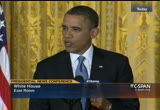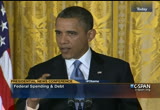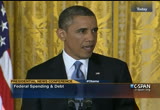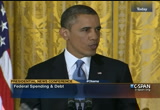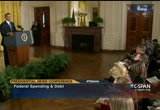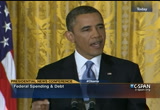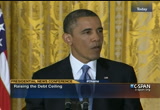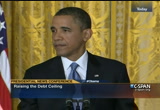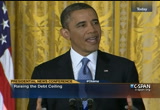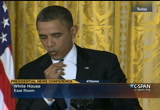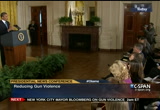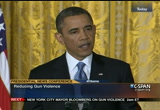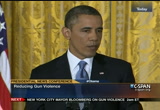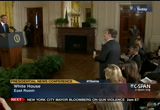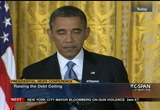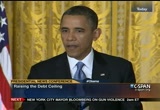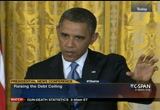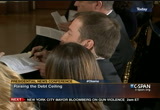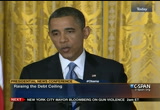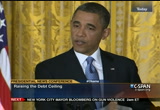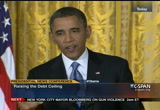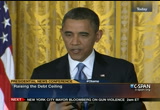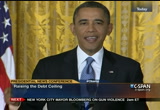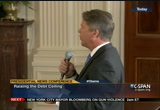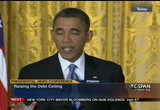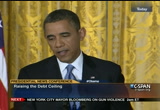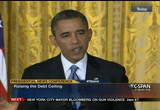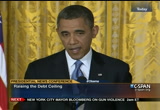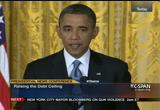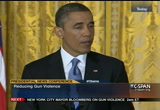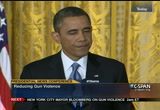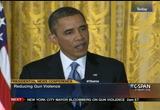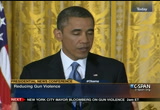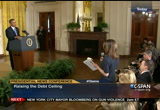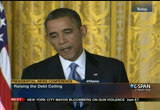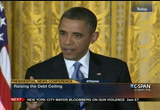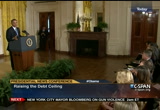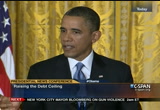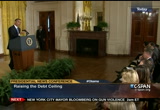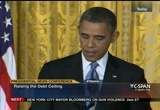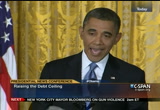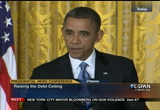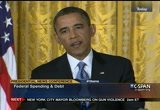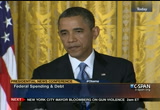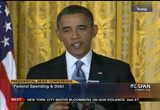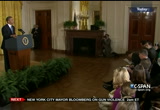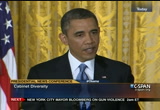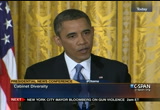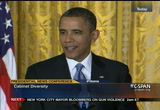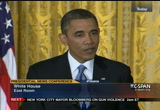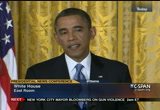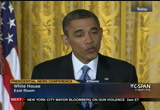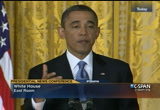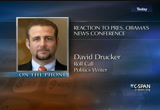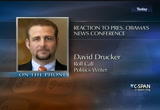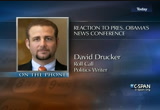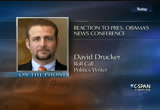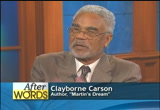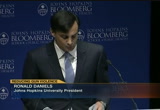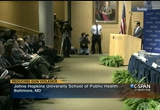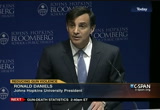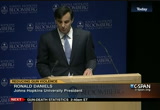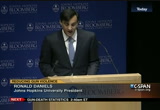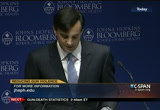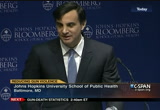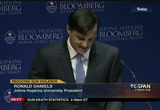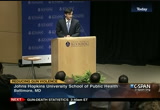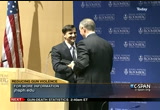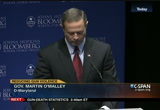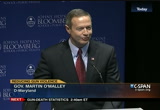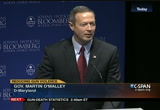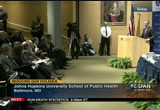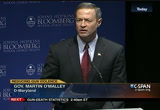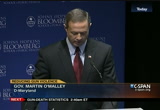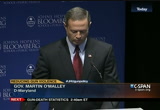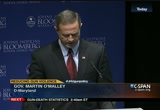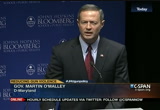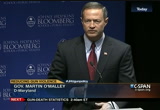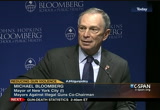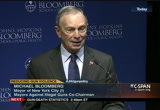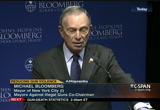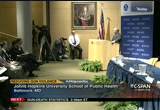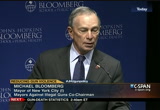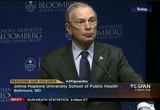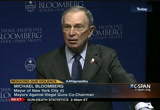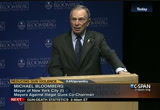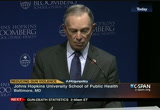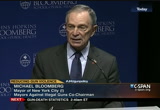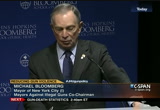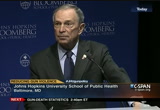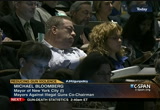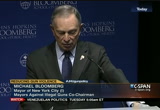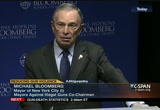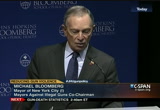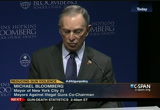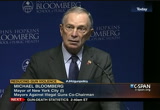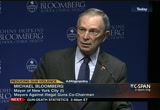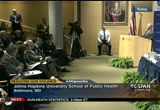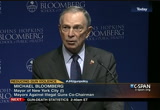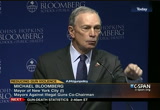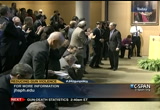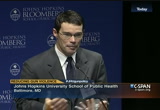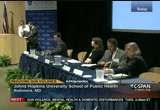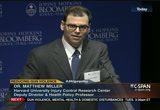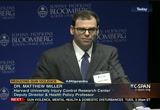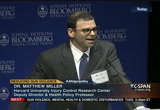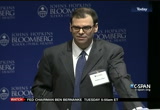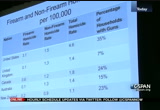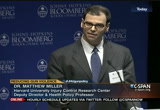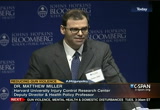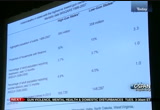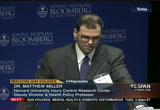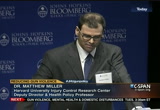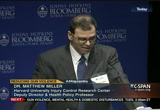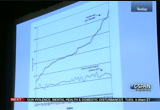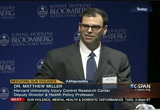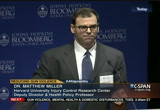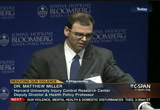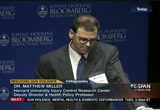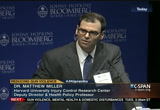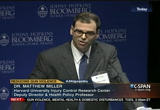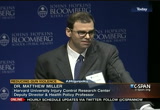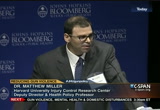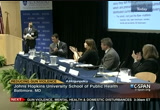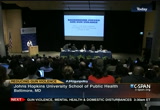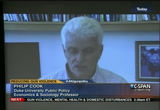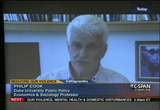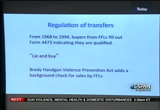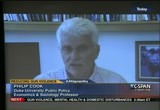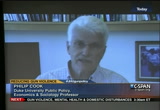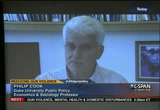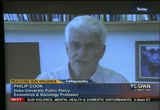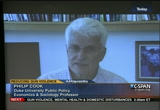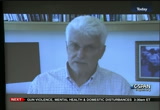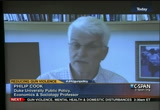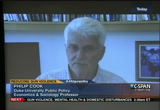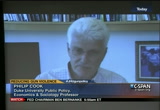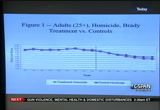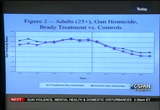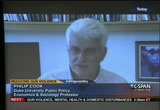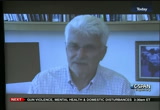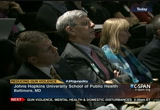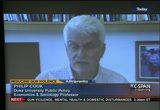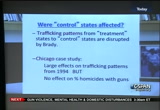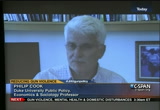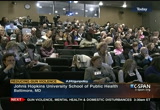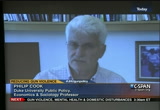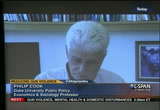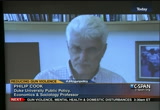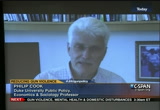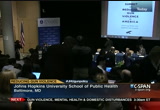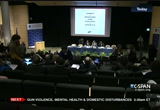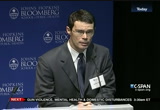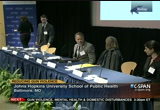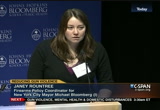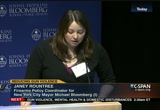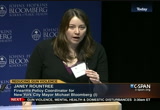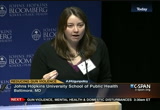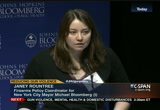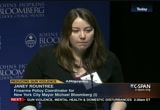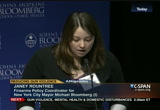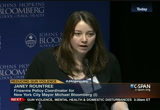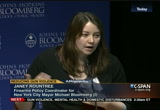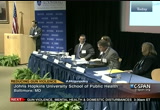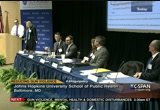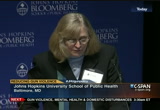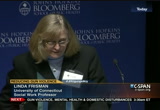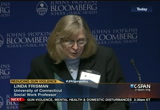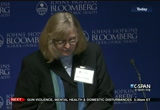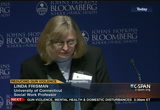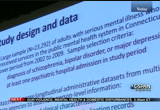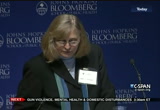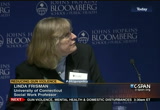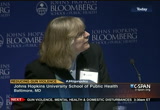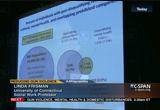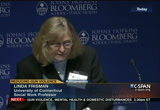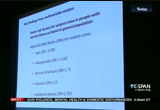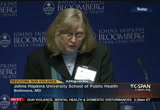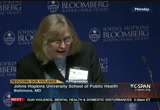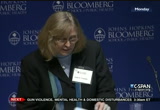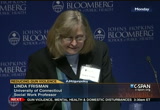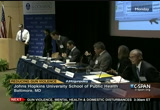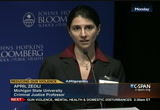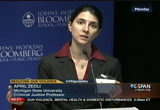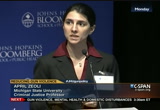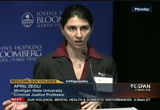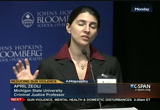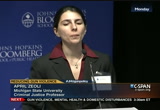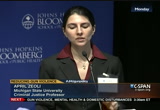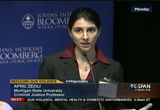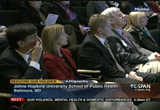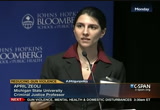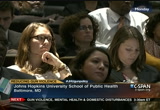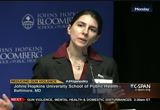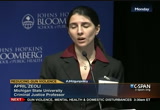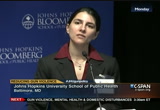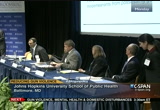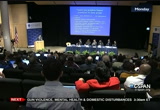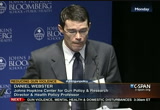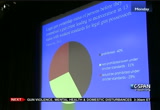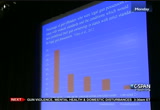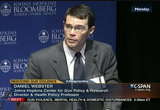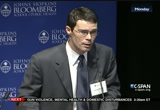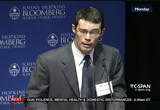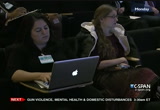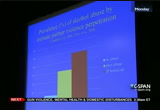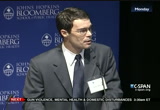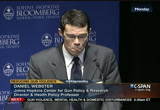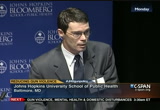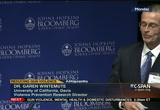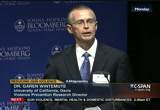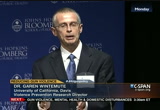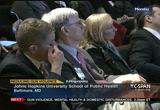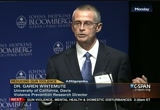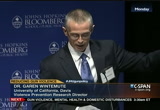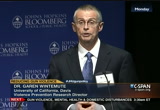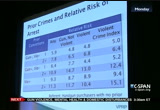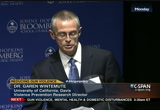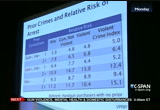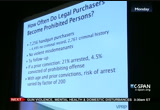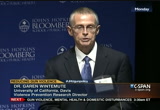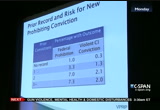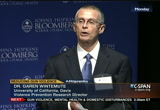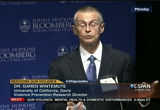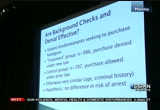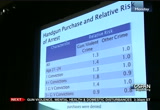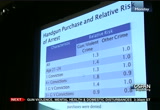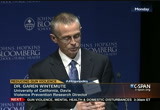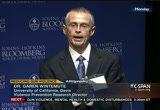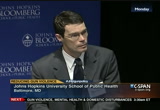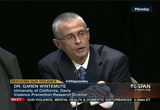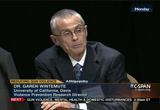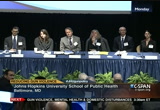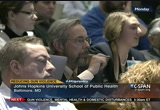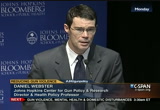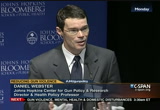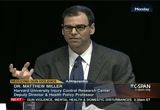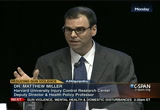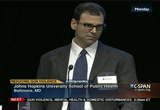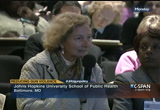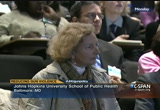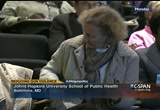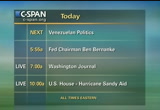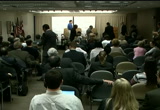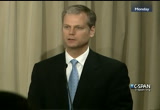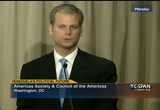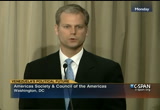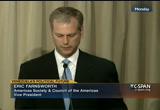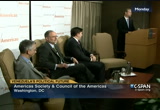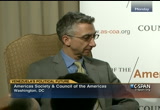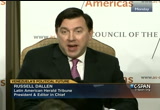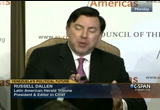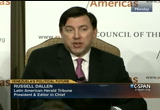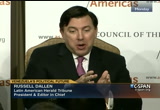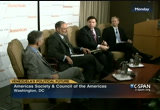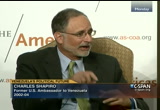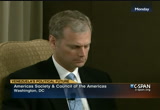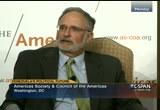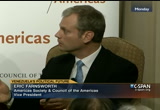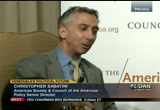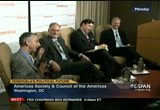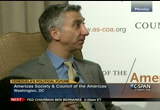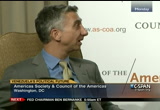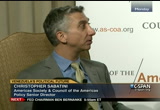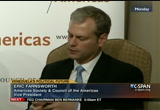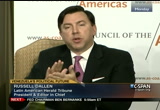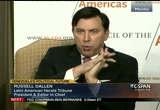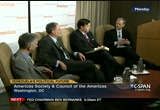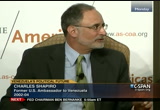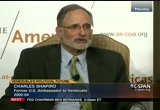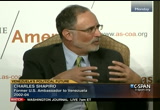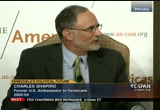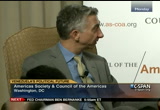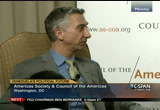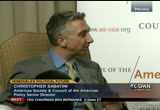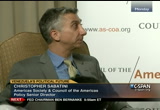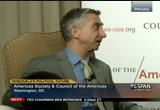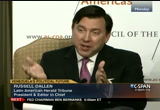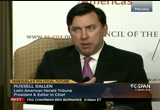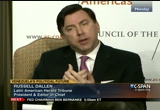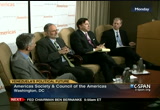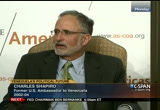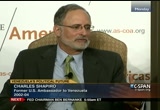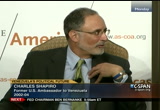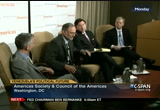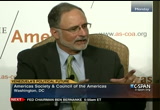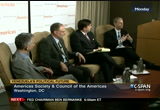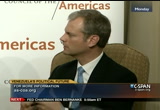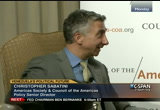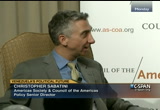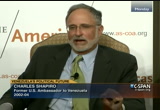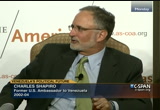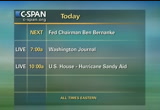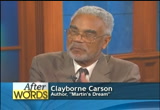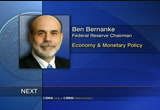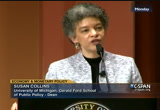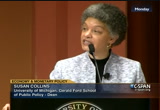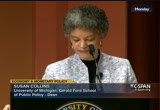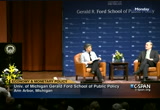tv Politics Public Policy Today CSPAN January 15, 2013 1:00am-6:00am EST
1:00 am
to carry out the agenda i campaigned on. new security for the middle class. right now our economy is growing and our businesses are creating new jobs. we are poised for a good year. if we make smart decisions in sound investments, and as long as i said on the campaign, one component to growing our economy and broadening opportunity for the middle class is shrinking our deficits in a balanced and responsible way. and for nearly two years now, i've been fighting for such a plan -- one that would reduce our deficits by $4 trillion over the next decade, which would stabilize our debt and our deficit in a sustainable way for the next decade.
1:01 am
that would be enough not only to stop the growth of our debt relative to the size of our economy, but it would make it manageable so it doesn't crowd out the investments we need to make in people and education and job training and science and medical research -- all the things that help us grow. now, step by step, we've made progress towards that goal. over the past two years, i've signed into law about $1.4 trillion in spending cuts. two weeks ago, i signed into law more than $600 billion in new revenue by making sure the wealthiest americans begin to pay their fair share. when you add the money that we'll save in interest payments on the debt, all together that adds up to a total of about $2.5 trillion in deficit reduction over the past two years -- not counting the $400 billion already saved from winding down the wars in iraq and afghanistan. so we've made progress. we are moving towards our ultimate goal of getting to a $4 trillion reduction. and there will be more deficit reduction when congress decides what to do about the $1.2 trillion in automatic spending
1:02 am
cuts that have been pushed off until next month. the fact is, though, we can't finish the job of deficit reduction through spending cuts alone. the cuts we've already made to priorities other than medicare, medicaid, social security and defense mean that we spend on everything from education to public safety less as a share of our economy than it has -- than has been true for a generation. and that's not a recipe for growth. so we've got to do more both to stabilize our finances over the medium and long term, but also spur more growth in the short term. i've said i'm open to making modest adjustments to programs like medicare to protect them for future generations. i've also said that we need more revenue through tax reform by closing loopholes in our tax code for the wealthiest americans. if we combine a balanced package of savings from spending on health care and revenues from closing loopholes, we can solve the deficit issue without
1:03 am
sacrificing our investments in things like education that are going to help us grow. it turns out the american people agree with me. they listened to an entire year's debate over this issue, and they made a clear decision about the approach they prefer. they don't think it's fair, for example, to ask a senior to pay more for his or her health care, or a scientist to shut down lifesaving research so that a multimillionaire investor can pay less in tax rates than a secretary. they don't think it's smart to protect endless corporate loopholes and tax breaks for the wealthiest americans rather than rebuild our roads and our schools, invest in our workers' skills, or help manufacturers bring jobs back to america. so they want us to get our
1:04 am
books in order in a balanced way, where everybody pulls their weight, everyone does their part. that's what i want as well. that's what i've proposed. and we can get it done, but we're going to have to make sure that people are looking at this in a responsible way rather than just through the lens of politics. now, the other congressionally imposed deadline coming up is the so-called debt ceiling -- something most americans hadn't even heard of before two years ago. i want to be clear about this. the debt ceiling is not a question of authorizing more spending. raising the debt ceiling does not authorize more spending. it simply allows the country to pay for spending that congress has already committed to. these are bills that have already been racked up and we need to pay them. so while i'm willing to
1:05 am
compromise and find common ground over how to reduce our deficits, america cannot afford another debate with this congress about whether or not they should pay the bills they've already racked up. if congressional republicans refuse to pay america's bills on time, social security checks and veterans' benefits will be delayed. we might not be able to pay our troops, or honor our contracts with small business owners. food inspectors, air traffic controllers, specialists who track down loose nuclear material wouldn't get their paychecks. investors around the world will ask if the united states of america is, in fact, a safe bet.
1:06 am
markets could go haywire. interest rates would spike for anybody who borrows money -- every homeowner with a mortgage, every student with a college loan, every small business owner who wants to grow and hire. it would be a self-inflicted wound on the economy. it would slow down our growth, might tip us into recession, and ironically, would probably increase our deficit. so to even entertain the idea of this happening -- of the united states of america not paying its bills -- is irresponsible. it's absurd. as the speaker said two years ago, it would be -- and i'm quoting speaker boehner now -- "a financial disaster, not only for us, but for the worldwide
1:07 am
1:08 am
but they will not collect a ransom in exchange for not crashing the american economy. the financial well-being of the american people is not leverage to be used. the full faith and credit of the united states of america is not a bargaining chip. and they better choose quickly, because time is running short. the last time republicans in congress even flirted with this idea, our aaa credit rating was downgraded for the first time in our history, our businesses created the fewest jobs of any month in nearly the past three years, and, ironically, the whole fiasco actually added to the deficit.
1:09 am
so it shouldn't be surprising, given all this talk, that the american people think washington is hurting, rather than helping, the country at the moment. they see their representatives consumed with partisan brinksmanship over paying our bills, while they overwhelmingly want us to focus on growing the economy and creating more jobs. so let's finish this debate. let's give our businesses and the world the certainty that our economy and our reputation are still second to none. we pay our bills.
1:10 am
we handle our business. and then we can move on -- because america has a lot to do. we've got to create more jobs. ofve got to boost the wages those who have work. we've got to reach for energy independence. we've got to reform our immigration system. we've got to give our children the best education possible, and we've got to do everything we can to protect them from the horrors of gun violence.
1:11 am
and let me say i'm grateful to vice president biden for his work on this issue of gun violence and for his proposals, which i'm going to be reviewing today and i will address in the next few days and i intend to vigorously pursue. so, with that, i'm going to take some questions. with'm going to start julie pace of ap. and i want to congratulate julie for this new, important job. >> thank you very much. >> yes. >> i wanted to ask about gun
1:12 am
violence. today marks the one-year -- or one-month anniversary of the shooting in newtown, which seemed to generate some momentum for reinstating the assault weapons ban. but there's been fresh opposition to that ban from the nra. and even harry reid has said that he questions whether it could pass congress. given that, how hard will you push for an assault weapons ban? and if one cannot pass congress, what other measures would need to be included in a broad package in order to curb gun violence successfully? >> well, as i said, the vice president and a number of members of my cabinet went through a very thorough process over the last month, meeting with a lot of stakeholders in this including the nra, listened to proposals from all quarters, and they've presented me now with a list of sensible, common-sense steps that can be taken to make sure that the kinds of violence we saw at newtown doesn't happen again. i'm going to be meeting with the vice president today. i expect to have a fuller presentation later in the week to give people some specifics about what i think we need to do. my starting point is not to worry about the politics, my starting point is to focus on what makes sense, what works, what should we be doing to make sure that our children are safe and that we're reducing the incidents of gun violence. and i think we can do that in a sensible way that comports with the second amendment. and then members of congress i think are going to have to have
1:13 am
a debate and examine their own conscience -- because if, in fact -- and i believe this is true -- everybody across party lines was as deeply moved and saddened as i was by what happened in newtown, then we're going to have to vote based on what we think is best. we're going to have to come up with answers that set politics aside. and that's what i expect congress to do. but what you can count is, is that the things that i've said in the past -- the belief that we have to have stronger background checks, that we can do a much better job in terms of keeping these magazine clips with high capacity out of the hands of folks who shouldn't have them, an assault weapons ban that is meaningful -- that those are things i continue to believe make sense. will all of them get through this congress? i don't know. but what's uppermost in my mind is making sure that i'm honest with the american people and with members of congress about what i think will work, what i think is something that will make a difference. and to repeat what i've said earlier -- if there is a step we
1:14 am
can take that will save even one child from what happened in newtown, we should take that step. >> can a package be discussed to allow an assault weapons ban? >> i'll present the details later in the week. chuck todd, nbc. >> thank you, sir. as you know, the senate democrats, harry reid sent you a letter begging you, essentially, to take -- consider some sort of executive action on this debt ceiling issue. i know you've said you're not negotiating on it. your administration has ruled out the various ideas that have been out there -- the 14th amendment. but just this morning, one of the house democratic leaders, jim clyburn, asked you to use the 14th amendment and even said, sometimes that's what it takes. he brought up the emancipation proclamation as saying it took executive action when congress wouldn't act, and he compared the debt ceiling to that. so are you considering a plan b, and if not, why not? >> well, chuck, the issue here is whether or not america pays its bills. we are not a deadbeat nation. and so there's a very simple solution to this: congress authorizes us to pay our bills. now, if the house and the senate want to give me the authority so that they don't have to take these tough votes, if they want to put the responsibility on me to raise the debt ceiling, i'm happy to take it. mitch mcconnell, the republican leader in the senate, had a proposal like that last year, and i'm happy to accept it. but if they want to keep this responsibility, then they need to go ahead and get it done. and there are no magic tricks here. there are no loopholes. there are no easy outs. this is a matter of congress authorizes spending. they order me to spend. they tell me, you need to fund our defense department at such and such a level, you need to send out social security checks, you need to make sure that you are paying to care for our
1:15 am
veterans. they lay all this out for me because they have the spending power. and so i am required by law to go ahead and pay these bills. separately, they also have to authorize the raising of the debt ceiling in order to make sure that those bills are paid. and so, what congress can't do is tell me to spend x, and then say, but we're not going to give you the authority to go ahead and pay the bills. and i just want to repeat -- because i think sometimes the american people, understandably, aren't following all the debates here in washington -- raising the debt ceiling does not authorize us to spend more. all it does is say that america will pay its bills. and we are not a dead-beat nation. and the consequences of us not paying our bills, as i outlined in my opening statement, would be disastrous. so i understand the impulse to try to get around this in a simple way. but there's one way to get around this. there's one way to deal with it. and that is for congress to authorize me to pay for those items of spending that they have already authorized. and the notion that republicans in the house, or maybe some republicans in the senate, would suggest that "in order for us to get our way on
1:16 am
our spending priorities, that we would risk the full faith and credit of the united states" -- that i think is not what the founders intended. that's not how i think most americans think our democracy should work. they've got a point of view, democrats in congress have a point of view. they need to sit down and work out a compromise. >> you just outlined an entire rationale for why this can't happen. >> yes. >> and if -- then if -- and you're not negotiating on the debt ceiling. >> yes. >> so you're not negotiating and they say you have to negotiate,
1:17 am
and you're not considering another plan b, then do you just wait it out and we do go -- we do see all these things happen? >> well look, chuck, there are -- there's a pretty straightforward way of doing this and that is to set the debt ceiling aside, we pay our bills, and then we have a vigorous debate about how we're going to do further deficit reduction in a balanced way. keep in mind that what we've heard from some republicans in both the house and the senate is that they will only increase
1:18 am
the debt ceiling by the amount of spending cuts that they're able to push through and -- in order to replace the automatic spending cuts of the sequester -- that's $1.2 trillion. say it takes another trillion or trillion-two to get us through one more year, they'd have to identify $2.5 trillion in cuts just to get the debt ceiling extended to next year -- $2.5 trillion.
1:19 am
they can't even -- congress has not been able to identify $1.2 trillion in cuts that they're happy with. because these same republicans say they don't want to cut defense, they've claimed that they don't want to gut medicare or harm the vulnerable. but the truth of the matter is that you can't meet their own criteria without drastically cutting medicare, or having an impact on medicaid, or affecting our defense spending. so the math just doesn't add up. now, here's what would work. what would work would be for us to say we've already done close to $2 trillion in deficit
1:20 am
reduction, and if you add the interest that we won't be paying because of less spending and increased revenue, it adds up to about $2.5 trillion. the consensus is we need about $4 trillion to stabilize our debt and our deficit, which means we need about $1.5 trillion more. the package that i offered to speaker boehner before we -- before the new year would achieve that. we were actually fairly close in terms of arriving at that number. so if the goal is to make sure that we are being responsible about our debt and our deficit, if that's the conversation we're having, i'm happy to have that conversation. and by closing some additional loopholes through tax reform -- which speaker boehner has acknowledged can raise money in a sensible way -- and by doing some additional cuts, including making sure that we are reducing our health care spending, which is the main driver of our deficits, we can arrive at a package that gets this thing done. i'm happy to have that conversation.
1:21 am
what i will not do is to have that negotiation with a gun at the head of the american people -- the threat that "unless we get our way, unless you gut medicare or medicaid, or otherwise slash things that the american people don't believe should be slashed, that we're going to threaten to wreck the entire economy." that is not how historically this has been done. that's not how we're going to do it this time. >> no plan b? you're not searching for any other -- >> chuck, what i'm saying to you is that there is no simpler solution, no ready, credible solution, other than congress either give me the authority to raise the debt ceiling, or exercise the responsibility that they have kept for themselves and raise the debt ceiling. because this is about paying your bills. everybody here understands this. i mean, this is not a complicated concept. you don't go out to dinner and then eat all you want, and then leave without paying the check. and if you do, you're breaking the law. and congress should think about it the same way that the american people do. you don't -- now, if congress wants to have a debate about maybe we shouldn't go out to dinner next time, maybe we should go to a more modest restaurant, that's fine. that's a debate that we should have. but you don't say, in order for me to control my appetites, i'm going to not pay the people who already provided me services, people who already lent me the money. that's not showing any discipline. all that's doing is not meeting your obligations. you can't do that. and that's not a credible way to run this government.
1:22 am
we've got to stop lurching from crisis to crisis to crisis, when there's this clear path ahead of us that simply requires some discipline, some responsibility and some compromise. that's where we need to go. that's how this needs to work. major garrett. >> thank you, mr. president. as you well know, sir, finding votes for the debt ceiling can sometimes be complicated. you, yourself, as a member of the senate, voted against a debt ceiling increase. and in previous aspects of american history -- president reagan in 1985, president george herbert walker bush in 1990, president clinton in 1997 -- all signed deficit reduction deals that were contingent upon or in the context of raising the
1:23 am
debt ceiling. you, yourself, four times have done that. three times, those were related to deficit reduction or budget maneuvers. what chuck and i and i think many people are curious about is this new, adamant desire on your part not to negotiate, when that seems to conflict with the entire history in the modern era of american presidents and
1:24 am
the debt ceiling, and your own history on the debt ceiling. and doesn't that suggest that we are going to go into a default situation because no one is talking to each other about how to resolve this? >> well, no, major, i think if you look at the history, getting votes for the debt ceiling is always difficult, and budgets in this town are always difficult. i went through this just last year. but what's different is we never saw a situation as we saw last year in which certain groups in congress took such an absolutist position that we came within a few days of defaulting. and the fact of the matter is, is that we have never seen the debt ceiling used in this fashion, where the notion was, you know what, we might default unless we get 100 percent of what we want. that hasn't happened. now, as i indicated before, i'm happy to have a conversation about how we reduce our deficits further in a sensible way. although one thing i want to point out is that the american people are also concerned about how we grow our economy, how we put people back to work, how we make sure that we finance our workers getting properly trained and our schools are giving our kids the education we deserve. there's a whole growth agenda which will reduce our deficits that's important as well. but what you've never seen is the notion that has been presented, so far at least, by the republicans that deficit reduction -- we'll only count spending cuts, that we will raise the deficit -- or the debt ceiling dollar for dollar on spending cuts. there are a whole set of rules that have been established that
1:25 am
are impossible to meet without doing severe damage to the economy. and so what we're not going to do is put ourselves in a position where in order to pay for spending that we've already incurred, that our two options are we're either going to profoundly hurt the economy and hurt middle-class families and hurt seniors and hurt kids who are trying to go to college, or, alternatively, we're going to blow up the economy. we're not going to do that. >> -- open to a one-to-three-
1:26 am
month extension to the debt ceiling -- whatever congress sends you, you're okay with it? >> no, not whatever congress sends me. they're going to have to send me something that's sensible. and we shouldn't be doing this -- >> -- and we shouldn't be doing this on a one to three-month timeframe. why would we do that? this is the united states of america, major. what, we can't manage our affairs in such a way that we pay our bills and we provide some certainty in terms of how we pay our bills? look, i don't think anybody would consider my position unreasonable here. i have -- >> but why does it presuppose the need to negotiate and talk about this on a daily basis? because if default is the biggest threat to the economy, why not talk about it -- >> major, i am happy to have a conversation about how we reduce our deficits. i'm not going to have a monthly or every-three-months conversation about whether or not we pay our bills. because that in and of itself does severe damage. even the threat of default hurts our economy. it's hurting our economy as we speak. we shouldn't be having that debate. if we want to have a conversation about how to reduce our deficit, let's have that. we've been having that for the
1:27 am
last two years. we just had an entire campaign about it. and by the way, the american people agreed with me that we should reduce our deficits in a balanced way that also takes into account the need for us to grow this economy and put people back to work. and despite that conversation, and despite the election results, the position that's been taken on the part of some house republicans is that, "no, we've got to do it our way, and if we don't, we simply won't pay america's bills." well, that can't be a position that is sustainable over time. it's not one that's good for the economy now. it's certainly not going to be the kind of precedent that i want to establish not just for my presidency, but for future presidents, even if it was on the other side. forocrats don't like voting the debt ceiling when a republican is president, and yet you -- but you never saw a
1:28 am
situation in which democrats suggested somehow that we would go ahead and default if we didn't get 100 percent of our way. that's just not how it's supposed to work. jon karl. >> thank you, mr. president. on the issue of guns, given how difficult it will be -- some would say impossible -- to get any gun control measure passed through this congress, what are you willing or able to do, using the powers of your presidency, to act without congress? and i'd also like to know, what do you make of these long lines we're seeing at gun shows and gun stores all around the country? i mean, even in connecticut, applications for guns are up since the shooting in newtown. >> well, my understanding is the vice president is going to provide a range of steps that we can take to reduce gun violence. some of them will require legislation. some of them i can accomplish through executive action. and so i'll be reviewing those today.
1:29 am
and as i said, i'll speak in more detail to what we're going to go ahead and propose later in the week. but i'm confident that there are some steps that we can take that don't require legislation and that are within my authority as president. and where you get a step that has the opportunity to reduce the possibility of gun violence then i want to go ahead and take it. q any idea of what kind of steps? >> well, i think, for example, how we are gathering data, for example, on guns that fall into the hands of criminals, and how
1:30 am
we track that more effectively -- there may be some steps that we can take administratively as opposed through legislation. as far as people lining up and purchasing more guns, i think that we've seen for some time now that those who oppose any common-sense gun control or gun safety measures have a pretty effective way of ginning up fear on the part of gun owners that somehow the federal government is about to take all your guns away. and there's probably an economic element to that. it obviously is good for business.
1:31 am
but i think that those of us who look at this problem have repeatedly said that responsible gun owners, people who have a gun for protection, for hunting, for sportsmanship, they don't have anything to worry about. the issue here is not whether or not we believe in the second amendment. the issue is, are there some sensible steps that we can take to make sure that somebody like the individual in newtown can't walk into a school and gun down a bunch of children in a shockingly rapid fashion. and surely, we can do something about that. but part of the challenge that we confront is, is that even the slightest hint of some sensible, responsible legislation in this area fans this notion that somehow, here it comes and everybody's guns are going to be taken away. it's unfortunate, but that's the case.
1:32 am
and if you look at over the first four years of my administration, we've tried to tighten up and enforce some of the laws that were already on the books. but it would be pretty hard to argue that somehow gun owners have had their rights infringed. >> so you think this is an irrational fear that's driving all these people to go and stock up -- >> excuse me? >> do you think this is an irrational fear -- >> well, as i said, i think it's a fear that's fanned by those who are worried about the possibility of any legislation getting out there. julianna goldman. >> thank you, mr. president. i just want to come back to the debt ceiling, because in the summer of 2011, you said that you wouldn't negotiate on the debt ceiling, and you did. last year, you said that you wouldn't extend any of the bush tax cuts for the wealthy, and you did. so as you say now that you're not going to negotiate on the debt ceiling this year, why should house republicans take that seriously and think that if we get to the one-minute-to- midnight scenario, that you're not going to back down? >> well, first of all, julianna, let's take the example
1:33 am
of this year and the fiscal cliff. i didn't say that i would not have any conversations at all about extending the bush tax cuts. what i said was we weren't going to extend bush tax cuts for the wealthy -- and we didn't. now, you can argue that during the campaign i said -- i set the criteria for wealthy at $250,000 and we ended up being at $400,000. but the fact of the matter is millionaires, billionaires are paying significantly more in taxes, just as i said. so from the start, my concern was making sure that we had a tax code that was fair and that protected the middle class, and my biggest priority was making sure that middle-class taxes did not go up.
1:34 am
the difference between this year and 2011 is the fact that we've already made $1.2 trillion in cuts. and at the time, i indicated that there were cuts that we could sensibly make that would not damage our economy, would not impede growth. i said at the time i think we should pair it up with revenue in order to have an overall balanced package. but my own budget reflected cuts in discretionary spending. my own budget reflected the cuts that needed to be made, and we've made those cuts. now, the challenge going forward is that we've now made some big cuts, and if we're going to do further deficit reduction, the only way to do it is in a balanced and responsible way. the alternative is for us to go ahead and cut commitments that we've made on things like medicare, or social security, or medicaid, and for us to fundamentally change commitments that we've made to
1:35 am
make sure that seniors don't go into poverty, or that children who are disabled are properly cared for. for us to change that contract we've made with the american people rather than look at options like closing loopholes for corporations that they don't need, that points to a long-term trend in which we have fundamentally, i think, undermined what people expect out of this government -- which is that parties sit down, they negotiate, they compromise, but they also reflect the will of
1:36 am
the american people, that you don't have one narrow faction that is able to simply dictate 100 percent of what they want all the time or otherwise threaten that we destroy the american economy. another way of putting it is we've got to break the habit of negotiating through crisis over and over again. and now is as good of a time as any, at the start of my second term, because if we continue down this path, then there's really no stopping the principle. i mean, literally -- even in divided government, even where we've got a democratic president and a democratic senate, that a small group in the house of representatives could simply say every two months, every three months, every six months,
1:37 am
every year, we are going to more and more change the economy in ways that we prefer, despite strong objections of americans all across the country, or otherwise we're going to have america not pay its bills. and that is no way for us to do business. and by the way, i would make the same argument if it was a republican president and a republican senate and you had a handful of democrats who were suggesting that we are going to hijack the process and make sure that either we get our way 100 percent of the time, or otherwise we are going to default on america's obligations. >> -- line in the sand negotiating, how is that -- to the economy? >> no, no, look, what i've said is that i'm happy to have a conversation about deficit
1:38 am
reduction -- >> so you technically are willing to negotiate? >> no, julianna, look, this is pretty straightforward. either congress pays its bills or it doesn't. now, if -- and they want to keep this responsibility, if john boehner and mitch mcconnell think that they can come up with a plan that somehow meets their criteria that they've set for why they will -- when they will raise the debt ceiling, they're free to go ahead and try. but the proposals that they've put forward in order to accomplish that -- only by cutting spending -- means cuts to things like medicare and education that the american people profoundly reject. now, if they think that they
1:39 am
can get that through congress, then they're free to try. but i think that a better way of doing this is go ahead and say, we're going to pay our bills. the question now is how do we actually get our deficit in a manageable, sustainable way? and that's a conversation i'm happy to have. all right. matt spetalnick. >> thank you, sir. you've spoken extensively about the debt ceiling debate, but some republicans have further said that they're willing to allow a government shutdown to take place rather than put off deep spending cuts. are you prepared to allow the government to grind to a halt if you disagree with the spending cut proposals they put forth? and who do you think the
1:40 am
american people would blame if that came to pass? >> well, ultimately, congress makes the decisions about whether or not we spend money and whether or not we keep this government open. and if the republicans in congress have made a decision that they want to shut down the government in order to get their way then they have the votes at least in the house of representatives, probably, to do that. i think that would be a mistake. i think it would be profoundly damaging to our economy. i think it would actually add to our deficit because it will impede growth. i think it's shortsighted. but they're elected representatives, and folks put them into those positions and they're going to have to make a
1:41 am
decision about that. and i don't -- i suspect that the american people would blame all of washington for not being able to get its act together. but the larger issue here has to do with what is it that we're trying to accomplish. are we trying to reduce the deficit? because if we're trying to reduce the deficit, then we can shape a bipartisan plan to reduce the deficit. i mean, is that really our objective? our concern is that we're spending more than we take in, and if that's the case, then there's a way of balancing that out so that we take in more money in increasing revenue and we reduce spending. and there's a recipe for getting that done. and in the conversations that i had with speaker boehner before the end of the year, we came pretty close -- a few hundred billion dollars separating us when stretched over a 10-year period, that's not a lot. but it seems as if what's motivating and propelling at this point some of the house republicans is more than simply deficit reduction. they have a particular vision about what government should and should not do. so they are suspicious about government's commitments, for example, to make sure that seniors have decent health care as they get older. they have suspicions about social security. they have suspicions about whether government should make sure that kids in poverty are getting enough to eat, or whether we should be spending money on medical research. so they've got a particular view of what government should do and should be. and that view was rejected by the american people when it was
1:42 am
debated during the presidential campaign. i think every poll that's out there indicates that the american people actually think our commitment to medicare or to education is really important, and that's something that we should look at as a last resort in terms of reducing the deficit, and it makes a lot more sense for us to close, for example, corporate loopholes before we go to putting a bigger burden on students or seniors. but if the house republicans disagree with that and they want to shut down the government to see if they can get their way on it, that's their prerogative. that's how the system is set up. it will damage our economy. the government is a big part of this economy, and it's interesting that a lot of times you have people who recognize that when it comes to defense spending -- some of the same folks who say we've got to cut spending, or complain that government jobs don't do
1:43 am
anything, when it comes to that defense contractor in their district, they think, wow, this is a pretty important part of the economy in my district and we shouldn't stop spending on that. let's just make sure we're not spending on those other folks. >> -- find agreement with republicans on this and -- >> look, my hope is, is that common sense prevails. that's always my preference. and i think that would the preference of the american people, and that's what would be good for the economy. so let me just repeat: if the issue is deficit reduction, getting our deficits sustainable over time, getting our debt in a sustainable place, then democrats and republicans in congress will have a partner
1:44 am
with me. we can achieve that, and we can achieve it fairly quickly. i mean, we know what the numbers are. we know what needs to be done. we know what a balanced approach would take. we've already done probably more than half of the deficit reduction we need to stabilize the debt and the deficit. there's probably been more pain and drama in getting there than we needed. and so finishing the job shouldn't be that difficult -- if everybody comes to the conversation with an open mind, and if we recognize that there are some things, like not paying our bills, that should be out of bounds.
1:45 am
all right. i'm going to take one last question. jackie calmes. >> thank you, mr. president. >> yes. >> i'd like to ask you, now that you've reached the end of your first term, starting your second, about a couple of criticisms -- one that's longstanding, another more recent. the longstanding one seems to have become a truism of sorts that you're -- you and your staff are too insular, that you don't socialize enough. and the second, the more recent criticism is that your team taking shape isn't diverse -- isn't as diverse as it could be, or even was, in terms of getting additional voices, gender, race, ethnic diversity. so i'd like you to address both of those. >> sure.
1:46 am
let me take the second one first. i'm very proud that in the first four years we had as diverse, if not more diverse, a white house and a cabinet than any in history. and i intend to continue that, because it turns out that when you look for the very best people, given the incredible diversity of this country, you're going to end up with a diverse staff and a diverse team. and that very diversity helps to create more effective policymaking and better decision-making for me, because it brings different perspectives to the table. so if you think about my first four years, the person who probably had the most influence on my foreign policy was a woman. the people who were in charge of moving forward my most important domestic initiative, health care, were women. the person in charge of our homeland security was a woman. my two appointments to the supreme court were women, and 50 percent of my white house staff were women. so i think people should expect that that record will be built upon during the next four years. now, what, i've made four appointments so far? and one women -- admittedly, a high-profile one -- is leaving the -- has already left the administration, and i have made a replacement. but i would just suggest that
1:47 am
everybody kind of wait until they've seen all my appointments, who's in the white house staff and who's in my cabinet before they rush to judgment. >> --the big three. >> yes, but i guess what i'm saying, jackie, is that i think until you've seen what my overall team looks like, it's premature to assume that somehow we're going backwards. we're not going backwards, we're going forward. with respect to this "truism" about me not socializing enough and patting folks on the back and all that stuff, most people who know me know i'm a pretty friendly guy. [laughter] and i like a good party. [laughter] and the truth is that when i was in the senate, i had great
1:48 am
relationships over there, and up until the point that i became president this was not an accusation that you heard very frequently. i think that really what's gone on in terms of some of the paralysis here in washington or difficulties in negotiations just have to do with some very stark differences in terms of policy, some very sharp differences in terms of where we stand on issues. and if you think about, let's say, myself and speaker boehner, i like speaker boehner personally, and when we went out and played golf we had a great time. but that didn't get a deal done in 2011. when i'm over here at the congressional picnic and folks are coming up and taking pictures with their family, i promise you, michelle and i are
1:49 am
very nice to them and we have a wonderful time. [laughter] but it doesn't prevent them from going onto the floor of the house and blasting me for being a big-spending socialist. [laughter] and the reason that, in many cases, congress votes the way they do, or talks the way they talk, or takes positions in negotiations that they take doesn't have to do with me. it has to do with the imperatives that they feel in terms of their own politics -- right? they're worried about their district. they're worried about what's going on back home. i think there are a lot of republicans at this point that feel that given how much energy has been devoted in some of the media that's preferred by republican constituencies to
1:50 am
demonize me, that it doesn't look real good socializing with me. charlie crist down in florida i think testifies to that. and i think a lot of folks say, well, if we look like we're being too cooperative or too chummy with the president that might cause us problems. that might be an excuse for us to get a challenge from somebody in a primary. so that tends to be the challenge. i promise you, we invite folks from congress over here all the time. and when they choose to come, i enjoy their company. sometimes they don't choose to come, and that has to do with the fact that i think they don't consider the optics useful for them politically. and, ultimately, the way we're
1:51 am
going to get stuff done -- personal relationships are important, and obviously i can always do a better job, and the nice thing is, is that now that my girls are getting older, they don't want to spend that much time with me anyway, so i'll be probably calling around, looking for somebody to play cards with me or something, because i'm getting kind of lonely in this big house. [laughter] so maybe a whole bunch of members of the house republican caucus want to come over and socialize more. but my suspicion is getting the issues resolved that we just talked about, the big stuff -- whether or not we get sensible laws passed to prevent gun violence, whether or not america is paying its bills, whether or not we get immigration reform done -- all that's going to be determined largely by where the respective parties stand on policy, and maybe most importantly, the attitude of the american people. if the american people feel strongly about these issues and they push hard, and they reward or don't reward members of congress with their votes, if they reject sort of uncompromising positions or sharp partisanship or always looking out for the next election, and they reward folks
1:52 am
1:53 am
>> david drucker has reaction to the final news conference of the president's first term. what was he trying to say to congress? >> he wanted to outline the perameters of the debate. he was wanting to define what the debt ceiling fight should or shouldn't be about. that is a shot at republicans who say they want deep spending cuts to grant the authority to the president to borrow more money. >> when will all of this come to a head? >>sometime in february or march. the treasury department says the measures they are using to make sure the country can pay its bills will expire sometime in february or march. what we deal with is -- technically, we should have passed the debt ceiling at the beginning of the year but we
1:54 am
were able to extend the period and the treasury says -- at least by march, sometime in march, they will need authority from congress to borrow more money. >> how are republicans in congress reacting to the comments? >> republicans in the house side are just getting into town and they will disappear for their political retreat. senate republicans are not scheduled to be in this week. i know from following twitter and following the reaction from speaker boehner and mitch mcconnell they didn't agree with his comments and expect to pass legislation on the house side and passing legislation for the debt ceiling and the spending issue, as they see it. >> is any of this complimented
1:55 am
1:56 am
>> david drucker, of "roll call." thank you. >> in a few moments, a forum regarding gun violence. including comments from new york city mayor michael bloomberg. in about 45 minutes, a discussion of gun violence statistics. followed by the relationship between mental-health, gun violence, and domestic cases. >> he had been talking about the stream he had had. he had been talking about it for years, the american dream. he was in detroit a few months before. he talked about, i have a dream. that america will someday realize these principles and the declaration of independence. he was inspired by that moment. >> sunday, clayborn recalls his
1:57 am
journey as a civil rights activist. it is part of three days of booktv. >> new york city mayor michael bloomberg is calling on congress and the white house to reduce gun violence. he spoke at johns hopkins university in baltimore. he said congress is hampering baltimore efforts. he was joined by maryland governor martin o'malley for this event.
1:58 am
>> it is important to note where we are gathering. in the past year alone, there were more than 2700 gun related crimes in baltimore. sadly, this is a place where gun violence is not a surprising event. on this anniversary, gathered in a city that must contend daily with the unforgiving toll of gun violence, the importance of this summit cannot be overstated. because our conversations, it will be on the backdrops of a bleak record. it is tempting to regard this summit as one more exercise in
1:59 am
futility. the skeptics feel good ideas are no match for the formidable interests that oppose gun control legislation. town.is even after new t i urge a more optimistic view. it is predicated on the belief we are not tethered to the matrix of inadequate national gun laws. despite a long history of failed legislative and policy reform, of opportunities inexplicably squandered, progress is possible. my optimism stems from two sources. first is the fact that in other countries, they have adopted nontrivial policy changes in response to gun violence
2:00 am
without entrenching on personal liberally -- liberty. brazil >> their political institutions are different than ours. gun culture is an alien concept. there are lessons to be gleaned from the approaches they have taken to successfully address the wanton loss of life from gun violence. we can and must learn from the experience of others. the second piece of my optimism comes from this country's history. in recent centuries, there is no denying the change in public sentiment that has undergirded policy reforms on drunk and public vaccination. big tobacco resented eight seemingly impregnable barrier against regulation, until it
2:01 am
happens. this is often the story behind monumental changes in us policy. consider the civil rights act of 1964. it took lyndon johnson to probably send it forward. he overcame what seems to be an unshakable logjam. in short, in our lifetimes, we have served enough nontrivial policy changes to recognize the inherent iron grip of status quo forces can be shattered and policy can progress. in the next few weeks, we can anticipate and hope that the debate over the regulation of guns and the balance between individual rights and civic obligation will command sustained into serious attention from our political leadership. advocates will mobilize as lobbyists plied their cases. in this unruly mix, universities
2:02 am
like ours can and will discharge a critical role in providing principled scaffolding for this debate. here at johns hopkins, our scholars have been investigating the public health effects of gun violence for well over two decades. for the past 17 years, the center for gun aussie and research, envisaged by our colleague, has provided a home for that study areas producing nationally recognized research and recommendations aimed at understanding and curtailing the impact of gun violence. the research produced that we have accumulated a wealth of knowledge and we hope much of it will come to the floor over the next two days. this summit has convened scholars and advocates from across fields and across the world. we want to use this opportunity to cut through the din of the shrill and incendiary, the rancorous and the baseless, i
2:03 am
identifying specific things. any possibility of change depends on a complex alchemy of ideas, shrewd political strategies, and inspired leadership. the gun policy debate, there has been no more effective leader than the namesake of the school, johns hopkins graduate, new york mayor, michael bloomberg. [applause]mayor bloomberg convened the first summit on illegal guns in april 2006. following that, he articulated the mayors shared intention to
2:04 am
crack down on illegal guns, using every tool at their disposal. after all, if congress will not take the lead, he concluded, we have to. and so he has. in the nearly seven years since, he has made the removal of such weapons from the streets of new york a primary focus. it led to the growth of mayors against illegal guns to include more than 800 municipal leaders and nearly one million followers. as a defender of the second .mended an -- amendment in fact, the mayor may comprise most of my optimism. and public health issue after issue, he has exhibited courage, stamina, and focused determination to enact lifesaving policy changes. his ideas are rounded in
2:05 am
research and data and his commitment is absolute. in short, i would not want to find myself on the opposite side of an issue in which he has invested his considerable intellectual and political skills. he will speak in just a moment. at this point, i would like to invite governor martin o'malley to the podium. [applause]wait a second. the former mayor of this great city, a longtime supporter of johns hopkins, and a national leader in smart data-driven efforts around public safety. fighting crime -- a violent crime in maryland has fallen since he was elected to office. under his leadership, state officials have participated actively in task forces and other partnerships with parts of more -- with baltimore.
2:06 am
is launched collaborations to help with criminal justice in neighbor in states. the government has spoken out to prohibit assault weapons. he predicted that maryland general assembly will ban such guns are in the current legislative session. all you have to do is look at today's washington post to see the scope of his commitment. i know the governor has just a few things on his plate. his decision to join us here today is clearly a reflection of the deep commitment he has for this cause. governor o'malley, welcome back to johns hopkins university. [applause]>> mr. president, thank you very much. thank you for the amazing work
2:07 am
that goes on here at johnson and so many realms. it is always a great honor to be here. especially to warm up for mike bloomberg. proud alumnus. very few of your sons have done quite so much for johns hopkins as mayor bloomberg has. he has been a terrific friend to the city of baltimore. we were here together just this past april. i was to dedicate the charlotte are bloomberg children center, named in honor of his mother. it looks like one of the most handsome new buildings in baltimore. a great american once said that no nation whose citizens fear to walk their own streets is healthy. there is a sickness in our country. that sickness is gun violence.
2:08 am
it is fitting that we are here at the bloomberg school, because gun violence is truly a public health issue. it is about the health of our cities and our towns. it is about the health of our neighborhoods and our economy. it is about the health of our schools and our schoolchildren. and our communities. and the health of our neighbors. mayor bloomberg, the people of new york have seen, is an effective, results oriented mayor. one of the most effective mayors ever to serve new york, or any city. creating jobs, expanding opportunity, improving city schools. watching america's most successful affordable housing initiative. largest, and one of the most innovative affordable housing initiatives. also fighting crime. really showing us, that it is
2:09 am
possible to make a safer tomorrow. we do not have to resign ourselves to the circumstances of the way things have always been. or what we have not been able to do the past. in fact, we can save lives. each life is precious and important. if you save just one month, it is as if you have saved the entire world. the people of america have also recognized something else that is very important to mike bloomberg. that is that he is not primarily partisan. he is about pulling people together to do the practical things that actually work. that is also the definition of what it takes to be an effective mayor. there is no democratic or republican way to fix a pothole. or any democratic or republican way to make sure the alleys are clean or the trash gets picked up. you see a problem, and bring people together, you fix it, and then you see results.
2:10 am
in this case, the measurer -- measurable results we will see our lives that are saved. this has been his driving argument when it comes to preventing gun violence. politically speaking, this is certainly not an easy issue for many elected figures. the mayor courageously chose to step up again and again, bringing other like-minded mayors together, including stephanie rawlings blake, and he did so consistently. his leadership really matters now because of the tragedies that have happened across our country areas in colorado, in wisconsin, and most lately in connecticut. there is a wider envelope for accomplishing the art of the possible. or putting in place commonsense things that that can prevent the sort of gun violence that has taken too many lives from us. we are here today because we
2:11 am
agreed that this issue is of paramount public safety importance. there is no more important responsibility that any government has been protect inc. and safeguarding the safety of its citizens. over a ten-year. of time, two of the three major cities that achieved biggest reductions in driving down violent crime have been new york, and baltimore was just behind. preventing violent crime, locking up the bad guys, keeping assault weapons from falling into the hands of deserved people -- disturbs people, these are not barometric measures. these are not conditions brought about by the gulf stream. are human problems. so how not to, are there
2:12 am
solutions. their solutions. i do believe that this year we will have success. later this week we will be introducing a comprehensive legislative act which that looks at weapons in the licensing of weapons and background checks, but also at schools. we are joined here by the superintendent of state school systems. we will also be looking at health and mental health areas we are also joined by our commissioner of health and middle hygiene -- mental hygiene. this will be a comprehensive legislative package to prevent gun violence. it addresses, not only the guns, but also mental health and school safety. it will ban military assault weapons that have no place on the streets of baltimore or any other neighborhood in our state.
2:13 am
it will also limit the size of magazines in order to make it harder for criminals to gun down, in succession, police officers or schoolchildren. it will secondly have a commonsense licensing requirements. for handguns, that respects the tradition of hunters and sportsmen. it will contain real reforms to improve mental health services. reforms like more timely data sharing. investments in better treatment. the creation of a new center for excellence on early intervention for serious mental illness. so that we are able to utilize more effective early intervention strategies. finally, it will invest in our schools to improve the safety of their facilities. so many of us have visited schools, and we know that what the primary mission, the
2:14 am
educational mission, that there is a wide spectrum when it comes to the safeguards in place on simple things like the doors being locked and visitors being checked in and the like. we will be creating a fund within our capital schoo budget. we are one of only about a dozen states that invest in school construction. that will help us bring schools up to higher standards. we will also be creating a maryland center for school safety that will bring together law enforcement with school officials, so that we actually have some better advice for school officials on the things that we can do to better safeguard the campuses of our schools. conclusion. i get to introduce our very honored and accomplished guest. neither mayor bloomberg nor any of us in maryland are seeking to ban all guns.
2:15 am
at the same time, we know that it makes absolutely no sense, when you look at the level of carnage on our streets from guns, to blame every factor but guns. if we are going to have a comprehensive approach, let us be comprehensive. including comprehensively looking at the licensing requirements for guns. we need a comprehensive approach that puts the focus on the practical, common sense things that we can do together to save lives. there may not be -- perhaps there is no way to completely prevent the next new town tragedy. then again, perhaps there is. none of us can predict the future. none of us can properly assess
2:16 am
the value of preventative programs that keep another tragedy from happening. and yet, we know that every life is valuable. therefore, that is why our inability to predict the future and the ability to fully pinpoint the value of preventative action can not be an excuse to keep from doing commonsense things. the commonsense tells us -- that common sense tells us can work. this is not about ideology. it is about human dignity. the dignity of every life. the dignity of those kids in connecticut. the dignity of every child and every person in the united states of america. it is with great honor that i introduce to you a man of effectiveness and great political courage, mayor michael bloomberg of the great city of new york. [applause]>> thank you.
2:17 am
governor, number one, thank you for rearranging your scheduled to be here today. the governor has always been a strong leader on gun violence. i remember meeting him in his office in baltimore before i was mayor, when he was mayor of this great duty. he was focusing on tackling gun crime then, and certainly now he is doing exactly the same thing. maryland is one of those states that has an urban-suburban, it has all of the problems that we have across this country. public health, public safety, education, economics, and it also has something that is very valuable -- it happens to have a great governor. i have been a big fan of governor o'malley's for a long time. i also want to thank you for your support of johns hopkins.
2:18 am
it is a great asset for baltimore and maryland and this country. you and your other elected officials deserve a great deal of credit for recognizing that. i hope that we have paid back. that you are getting something for your money. it is great to be back at my alma mater, johns hopkins. president -- your president called me a few weeks ago and said he was putting together the best minds in the world on gun violence. he did not have to ask twice. the fact is, they were able to hold this conference together so quickly, i think that shows the dynamic and energetic amendment to scholarship and public service that i have always thought really defines the hopkins spirit.
2:19 am
it is clear that we need today a critical and hopeful moment. one month ago, at roughly this time, on december 14, a deranged young man pulled into the parking lot of the sandy hook lament to school in newtown, connecticut. he shot his way into a building with a high-capacity semiautomatic rifle. the slaughter of six adults and 20 children really broke the heart of the country. for many americans, this is the straw that has been the camels back. -- broken the camel's back. or than 100 mayors across the country have joined our bipartisan coalition -- mayors against illegal guns. that brings our total number enrolled to more than 800. as of this morning, roughly one
2:20 am
million americans have also signed onto our coalition's "i demand a plan" campaign. i hope tomorrow vice president biden he will announce this recommended action to the president. i have spoken several times and the sandy hook massacre. he knows that as sir -- as horrific as that has been, we experienced that level of carnage, or worse, every single day across our country. every day of the year, an average of 33 americans are murdered with guns. here is another way to think about what that means. one week from today, president obama will take the oath of office for his second term. unless we take action, during those four years, some 48,000 americans will be killed with guns. nearly twice as many people as
2:21 am
were killed in combat during the entire vietnam war. when i have talked with the vice president, i have made it very clear that our bipartisan coalition of mayors is supporting seven measures. three that need legislation and for that require only executive action. we are hopeful the president and vice president will support all seven. i just wanted to touch on each of them briefly. first, most urgently, we need the president and congress together to require background checks for all gun sales, including private sales at gun shows and online. private sales now account for more than 40% of all gun sales nationally. which means that in 2012 alone, there were more than 6 million gun sales that happened with no projects. -- no background checks.
2:22 am
and guns, used in about 90% of all firearms murders. across the united states, more than 80% of gun owners and 90% of americans support requiring background checks for all gun sales. there is really no debate here. it is common sense. we have laws on the books that require a background check when dealers sell guns. it is time for the president and congress to make that a law of the land for all sales. 40% where the law does not apply to, means the law is basically a sham. second, congress should make done trafficking a federal crime. in new york city, 85% of the weapons we recover from crime scenes come from out-of-state sources. federal laws designed to curb illegal sales across borders are incredibly weak. criminals who traffic get a
2:23 am
slap on the wrist. we have made new york the safest big city in the nation, in part by adopting tough thomas -- tough gun laws and proactively enforcing them. every state in the union has citizens killed by guns coming from another state. every state is powerless to stop the mayhem. until congress gets tough on trafficking, guns will continue flowing to our streets from states with much looser than laws. the third legislative measure that the white house should support is limiting the availability of military style weapons and high-capacity magazines with more than 10 rounds. these guns and equipment are not designed for sports or home defense. they are designed to kill large numbers of people quickly. that is the only purpose they have. they belong on the battlefield. in the hands of our brave,
2:24 am
professionally trained soldiers. not on the streets of our cities, suburbs, or rural areas. retired military leaders like colin powell and stan mcchrystal have agreed. many of these categories of weapons were previously banned by a law that expired in 2004. it was first initiated and passed by joe biden. he is the right person for the president to have appointed to come up with what we should do next. regulating assault weapons certainly falls within the bounds of the second amendment. so does everything else we are urging. this is not a constitutional question. it is a question of political courage. the supreme court -- the one that defines what the constitution means and says -- has ruled that reasonable regulations are consistent with the second amendment.
2:25 am
when the gun lobby raises the second amendment, it is nothing but a red herring. it is time for second amendment defenders in congress to call them on it. the three measures i just mentioned, we will require leadership from both the president and members of congress. there are other steps that president obama can take without congressional approval. at any time he chooses, with just the stroke of a pen. vice president biden understands this, and we hope his recommendations will include at least these four steps we have urged. first, the president can order all federal agencies to submit the relevant data that they have to the national gun at ground check it a base. every missing record is a potential murder in the making. if the data is not in the
2:26 am
database, those people that do use the database do not get what they need. gun sales can go ahead in cases where we all agree, and federal law says, they should not. second, he can direct the justice department to make a priority of ross accusing convicted criminals who provide false personal information during gun purchase background checks. even criminals -- they lie. during 2010, there were more than 76,000 76,000 cases referred by the fbi to the justice department. you know how many were prosecuted out of that number? 44. not 44,000. 44 out of 76,000.
2:27 am
this is a joke. it is a sad joke. it is a lethal joke. these are felony cases involving criminals trying to buy guns. our federal government is prosecuting less than .1% of them. it is shameful and it has to end and the president can do it i picking up the phone and saying , this is your job. oh do it, or i will get somebody that will. the third, he can make a recess appointment. the ats has not had a director for six years. can you imagine how much out raged there would be if we had been without a homeland security secretary for six years? this is a public safety threat, as much as it would be if we had no secretary for homeland security.
2:28 am
if congress keeps blocking the appointees, all the president has to do is make a recess appointment. it is relatively easy and has been done many times. you cannot have an agency without somebody running it who will do the job it was created for. that job is to protect everyone in this room, everybody in this city, state, and country, including those that we love the most. our children. those we have the greatest responsibility to. the police officers who run into danger when the rest of us are running the other way. think about it. if congress specifically said, do not tell the public what is killing our kids and lease officers who are trying to protect us, would you have a problem with that? of course you would. the president -- this is our fourth recommendation. stop supporting the tar-art ord.
2:29 am
it keeps in the dark information about gun traffickers. there can be no excuse shielding criminals from public view. congress has tied the hands of the bureau of alcohol, tobacco, and firearms, and prevented it from releasing critical data to law enforcement authorities and the public. they are not alone in getting gagged by congress when it comes to the issue of guns. today, our bipartisan coalition of mayors against illegal guns is releasing a report called access denied. it details how congress, bowing to the gun lobby, has systematically denied the american people access to information about guns. most egregiously, congress has severely restricted the scientists at the center for disease control and prevention
2:30 am
from studying the epidemic of gun violence. they put similar restrictions on the scientists at the national institutes of health. congress has no business dictating what public health issues scientists can and should study. what are they afraid of? you are sitting here at johns hopkins. our motto is, the truth shall make you free. and elected officials try to muzzle scientific research and bury the truth, they make our society less free. and less safe. today, because of congressional restrictions, cdc funding for firearms injury research totals $100,000, out of an annual budget of nearly $6 billion. the national institute of health is estimated to spend less than $1 million on firearm injury research, out of an annual budget of rd $1 billion.
2:31 am
-- 31 billion. they spend more researching headaches than all the gun deaths that happen every year. if that does not give you a headache, it should. there are 31,000 gun deaths every year in america. including about 19,000 suicides. many of them are children. every parents nightmare. in new york city, i am happy to say, i do not know that it should be happy -- i am pleased to say, our suicide rate is less than half the national average. one of the big differences is that we have tough gun laws in new york. nationally, 51% of suicides are i gun. -- are by gun. in new york city, it is only 16%
2:32 am
of our suicides. the government says that someone who wants to kill him or herself will find ways to do it. in many cases, they are tragically wrong. we can prevent thousands of these senseless suicides with smart gun regulations. we are proving it in new york city. unfortunately, american scientists are not the only people that congress has attempted to silence. in 2010, again at the gun lobby's bidding, congress included language in a funding bill that prevented military officers and doctors, as well as mental health counselors, from even discussing firearms ownership with severely depressed servicemembers. there is a suicide crisis going on right now, as i am sure you have read about, in our military. it is tough being overseas. it is tough seeing and doing
2:33 am
what we ask our soldiers to do. we have an all volunteer army. they come back, and many of them do have a problem. congress, instead of trying to help, is doing everything it can to make it worse. our men and women in uniform deserve better. thankfully, after mayors and retired military leaders urged congress to rescind this prohibition, they did. only last month. and only after too many men and women in uniform have taken their own lives with guns. enough is enough. it is time for congress and the white house to put outlook health above special interest politics. it is time for congress to stop gagging our scientist, military leaders, and law enforcement officers and try -- stop trying to hide the truth from the american people. that is why this conference and your work is so important.
2:34 am
i think it is fitting that this conference is being held here at the bloomberg school of public health. with so much outstanding and important work being done, in areas from malaria research and environmental health, to tobacco control and road safety. it is all designed to protect health and save lives, millions at a time. reducing gun violence will have that kind of an impact, too. i want to thank the bloomberg school of public health. a few years ago, dr. webster conducted a study of an initiative we undertook in new york city. identifying the most problematic out-of-state gun dealers, based on crime data. conducting undercover operations of the sales practices and suing those that sold guns to straw purchasers.
2:35 am
straw purchasers are those who lie about who is the actual purchaser of the gun and stand in for somebody who could not pass a background check. 24 of the most problematic dealers settled or were put under a court monitor. dr. webster found the in new york city, the likelihood of recovering a gun at a crime scene from one of these dealers, almost overnight, dropped by 84%. 99% of the gun dealers in our country do obey the law. one percent do not. those are the ones that we have to go after. the results are dramatic and almost instantaneous. our investigation never would have happened without the data that allowed us to identify the problem that a dealers. and yet, if it were up to the nra, we would never have had access and more guns would have flowed onto our streets. in all likelihood more people would have been murdered.
2:36 am
the undercover investigations we conducted were just one example of how we work to crack down on them violence. at our urging in new york, our state legislature enacted the toughest penalties in the nation for illegal possession of a handgun. we have also worked with our city council to adopt a law enabling the nypd to keep tabs on gun offenders in our city. just as they track sex offenders. we enforce those laws and other laws rigorously. that is a big reason why new york is the safest big city in the country. in the year that just ended, new york city had the fewest murders in nearly half a century. comparable records are starting to be kept back in 1963. we have never had a year remotely as safe as the year we just had. as hard as we worked, however, and as much as we have achieved, the reality remains in new york that there were still thousands
2:37 am
of murders in new york city. while shooting incidents are down, i can tell you that on the thursday night last, i visited three nypd officers who had been shot by criminals in two separate incidents. thankfully, the officers are all expected to fully recover. i think that night really does demonstrate a flaw in the argument we have heard lately. the argument is, the solution to bad guys with guns is good guys with guns. the problem is, sometimes the good guys get shot. and times, in fact, they get killed. i think the hardest part of my job, the part that i dread the most as mayor, is talking to the family of a police officer at a hospital, to tell them that their husband, wife, mother,
2:38 am
father, son, or daughter, will not ever be coming home again. the tragic fact is, across america today, fathers and mothers, wives and husbands, who will experience that kind of pain and loss in their lives because of gun violence. the rate of firearms homicide in america is 20 times higher than it is in other economically advanced nations. we have got to change that. it has to start this week. real leadership from the white house. if you have not done so, go to demandaplan.org. join our campaign. call your senators or your congressman. tell them you are not going to take it. even if you vote the right way, your associates in congress are not voting the right way. since i do not get a chance to influence them, but you want my vote, you do something about it.
2:39 am
it is your responsibility to do it. thank you for coming to this conference. your work here is in the great tradition of your host. the best public health school in the nation. permit me to say that. let's hope that it gets the attention that washington needs to pay it. this is one of the real big differences between what we have today and a safe rate future for our kids. thank you, and god bless. [applause]>> more now from the
2:40 am
johns hopkins university forum on reducing gun violence. over the next 50 minutes, harvard university professor matthew miller looks at gun related epson the us. vice president joe biden is scheduled to present his proposal for reducing gun violence to hobo on tuesday -- president obama on tuesday. [captioning performed bynational captioning institute]>> we are going to start the program now. i would like to ask the presenters to take their seat. i want to say that there is information on the website about each of the bios of our speakers. i thought i could say, this is an all-star cast. then i started thinking, many
2:41 am
of these people are not just all stars. they are like all of fame as in gun violence. -- hall of fame as researchers in gun violence. i am going to say one sentence about each speaker. dr. miller is a preeminent expert who has published numerous articles that address the question he is going to address today -- what is the relationship between gun availability and violent death? i will turn it over to dr. miller. [applause]>> good morning. i would like to start by thanking daniel for organizing
2:42 am
this tremendous conference. and to susan for taking care of all the amazing logistics that made it possible. i also would like to thank mayor bloomberg for his abiding commitment to this issue. this morning, i am going to talk about the relationship between firearm availability and the lethal violence. i will start by giving you a sense of how we in the united states compared to other high income countries, and then look at the large disparities in lethal violence within the united states. as mayor bloomberg pointed out, most of the firearm suicides in this country -- most of the firearm deaths in this country are firearm suicides. there are almost twice as many firearm suicides as there are firearm homicides. in 2010, the last year for which
2:43 am
we have data, there are 19,000 firearm suicides. about 11,000 firearm homicides. there are almost as many americans who died from gunfire as die from motor vehicle crashes, and for americans under 40, more die from gunfire than any specific disease. compared to other high income countries, the united states has a uniquely huge lethal firearm problem. it has been said that a country can be judged by how well it takes care of and looks after its most vulnerable members. its children. by that measure, we do not look very good. this slide is meant to give you a sense of the difference in lethal violence in the united states compared to other countries in western europe and japan and elsewhere. for children five to 14 years of
2:44 am
age, in the united states, they are 13 times as likely to die from a firearm homicide. they are almost eight times as likely to die from a firearm suicide. 10 times as likely to die from a firearm accident. in this study, united states comprised about one out of 30, the almost nine out of 10 ~ and who died of firearm deaths. they live in the united states. there is no evidence that our children are more careless, more suicidal, or that they are more violent. they are dying by gunfire. why? i will first about the relationship between homicide and firearms. the first thing to get out of the way from the start is that the are not a more violent nation. in other high income nations. we are not a more violent society. we do not fight more in school.
2:45 am
we do not commit more violent crimes. it is a mistake to conflate lethal violence with overall violence. the next light is meant to demonstrate that. -- slide is meant to demonstrate that. if you look at the rate of violent crimes in the united states and look at them compared to other countries. -- compared to burglary, robbery, sexual assault, it falls right in the middle. there are other states that say united states are more likely to get into fights at school. are we more mentally ill? more rates of suicidal behavior? drug in all, problems? no, we do not. what we do have is more guns in civilian hands. especially handguns. we have much more permissive gun
2:46 am
control laws and more homicides. here is another example of how we compare to other countries. if you look at the last column, you see that we have more guns than other industrialized countries. this measure does not actually show you the great disparity in handguns, which of the guns that are used in most of the homicides. our firearm homicide rate, as you can see, is an order of magnitude higher than in these other countries. our rate of homicide with non- gun mechanisms -- knives, bats, whatever, is pretty much right where they are in the other high income countries. in that affect -- and that effect is that our homicide rate is more than twice as high as these other countries.
2:47 am
we are not more violent. but when we are violent, we kill. with guns. this is a slide that my colleagues helps me pull together. this is from data that is not readily available. what it is meant to show us this, where the guns come from that are used when people die by gunfire in this country. the big picture here is that for kids, older people, and women, the guns that kill them are household guns. they die in the home. to the best of our knowledge, the vast majority of these guns are legally owned. they are not trafficked. we do not have good data on that, but that is the general suggestion. men who are 15-30 years of age and dying on the streets, that is a different question.
2:48 am
when you are thinking about the science. does the availability of guns in peoples homes lead to an an increase in the likelihood that they are going to die? you have to ask what are the guns that are killing these people? where did it come from? for women and children and older people, they come from the home. for young men, they come from the street. in looking at the totality of the literature that has been developed over the past 30 years, individual studies and studies that looked at areas and compare them to one another, what we find is that where there are more guns, there is more death. there is more homicide, suicide , and there are more firearm accidents. these studies have taken pains to try to control for differences between homes with and without guns. states with and -- with more and
2:49 am
fewer guns. by taking these factors into account, they tried to render apples to apples type comparisons. what i am going to show you is a collection of states that have high levels of gun ownership. it is meant to illustrate the magnitude of the difference in lethal violence in places where it there are many and few guns. in thinking about what i am going to show you, remember that this is backed up i methodologically rigorous studies that try to control various factors. here is a demonstration. if you rank states from those with the highest level of gun ownership to those with the lowest level, and then you select the lowest level up to a point where you have 350 million people over an eight-year. , and the same thing with the
2:50 am
heightened states, and that you do not have to worry about rates. you have the same number of people. let us see how we are faring. the high gun states had a population -- 50% of the people who live in high gun states live in homes with tons. one out of two homes. one out of six in the low gun states. it did not differ in the rates of mental illness, the rates of suicide, the rates of violent crime. let's now look at lethal consequences of living there. homicide for women in the high gun states, over 3000 women killed with tons. there were about 1000 in the low gun states. the number of women who are killed with methods other than guns was not graphically
2:51 am
different. that effect was that there were 6000 women in the heightened states who were murdered, compared to about 3000 in the low gun states. a difference of 3000 lives. a ratio of two. you can look at the children and older people, and what you see is the same basic story. what about for men, 15 through 29 question mark they are not dying in the home. they are dying more often away from home. here, the evidence is not as striking. that, it is still there. there are more men who are dying in the high gun states by gunfire -- 7000 compared to 5000. not that big a difference for the non-gun homicide rate. a difference of almost 2000 lives on even among this group of men who are dying more often in the streets and in their homes. what about suicide?
2:52 am
almost two out of three firearm deaths in this country are suicides. these are all taking place in the home, by and large, with guns that have in there for a long time. the case-control studies done by several of the people here in the audience have controlled for various measures. alcohol and drug abuse, suicidal behavior in general, and what these studies find -- people who live in homes with guns are not more societal -- suicidal. they have higher rates of suicide. they are dying more likely from firearm suicide. the risk of a gun is not only associated with the person who bought the gun. it is a reasonable critique of the literature. i bought the gun, maybe i was
2:53 am
suicidal. you are going to find more guns when you do a study. but my kid did not buy a gun, nor did my wife. the relative risk for them is also high, or even higher for adolescents than the gun owner. there is a hierarchy of risk. the more cigarettes you smoke, the more likely you will die from lung cancer. all right. here is a slide i put together with my colleagues. what this is supposed to show you is how it you can actually dissociate rates of mental illness from rates of completed suicide. what this graph shows you is that the states from left to right, and increasing order of the rate of suicide, death by
2:54 am
suicide, what you see when you look at serious psychological distress is that there is no correlation between how often people are thinking about killing themselves to how often they are admitted for mental health problems or say they have depression with the rate at which they are dying. people are no more mentally ill in one state compared to another, by and large. a are dying at much higher rates by suicide when they live in states with more guns. if you plotted a line of gun ownership on top of this graph, you would see it would track very nicely with the line showing you an increasing risk of suicide. this renders, in two dimensions, what the methodological rigorous studies have shown in general. the axes are kind of tiny. i do not know if you can read
2:55 am
them. i think you would agree that one of these things does not belong with the other. to go together and one does not. the two that go together at the pink and blue dots. they show a line and slope increasing from the bottom to the top. the green dots look like they are scattered randomly. the pink dots show the guntionship between ownership in the state and suicide. the green dots show suicide and houses with gun ownership. if you live in areas where there are more guns, more people are dying by suicide. ok. it is sort of intuitive to people when you are talking about homicides that if someone shoots you, you are more likely to die than if they try to knife you to death. people do not think about suicide in the same
2:56 am
way. the similarities are striking. firearms are the most lethal method people use, of all the methods that are commonly used. many suicidal acts, like homicidal acts, are impulse of. crises are temporary. importantly, very few people who survive an attempt go on to die by suicide thereafter. what this means is if you can save a life in the short run, you save a life in the long run. otherwise, you would not see the strong relationships between gun ownership and overall rates of suicide. nor for homicide. here is a measure of the madness of what we are talking about. women in the high gun states -- over 4000 die by firearm suicide. about 500 in the low gun states.
2:57 am
the net effect -- 8781 women compared to 5138. you can look at the numbers for men, and we are talking about 18,000 more men. you can talk about the men who are killing one another, and you see the same thing that you do for women. men are using guns in their home and dying by suicide at twice the rate when they live in a high gun states. so, the united states, with our many guns in civilian hands, especially handguns, and our very permissive gun control laws, has a far more serious lethal violence problem than other comparable developed countries.
2:58 am
in the united states where guns are more available, more people are dying by suicide, homicide, and firearm accidents. the consistency of the finding across different types of studies by different researchers at different times, looking at different populations, is remarkable. there is no credible evidence otherwise. now, firearm policy is often focused on guns used in crimes. that makes sense when you are trying to prevent lethal homicides that are related to crime. it is an important focus. we should not lose sight of the fact that what is most notable about the studies i have reviewed here, and the strong literature in general, is the story that they tell more generally about guns, most of which are household guns. the stock of guns we have, the 300 million distributed across
2:59 am
one out of every three homes, the stock of guns matters. so does the flow. i have spent the last 18 minutes telling you about the relationship between firearms and lethal death in this country. i have not told you how difficult it has been to conduct this science, especially over the last 15 years, since the cdc has effectively choked off funding. few private foundations have stood up in the breach with the notable exceptions of the joyce foundation. mayor bloomberg gave you a good idea of just how much we are up against. i will not go into any further details. i will say that, having studied the relationship between firearms violence -- firearms and lethal violence for the past 20 years, i still think that we can make it difference. moreover, we are obliged to act on what we already know. some of which i have talked about this morning. the king about -- thinking
3:00 am
4:59 am
5:00 am
in government and our institutions. so i am asking the panel and all the people who will drive what we know is a great program for gun control -- the bad guys at the top of the social status -- social status are driving the problem. and if we will look aggressively at how to control individuals who will be pressed into desperate situations, we will not solve the problem. so please consider justice, rule of law as the primary driver of the problem we have at hand right now. thank you. >> thank you. clearly, there are many determinants of violence aside from guns. i don't think anyone here would argue otherwise.
5:01 am
-- some i don't think people have used that kind of argument though as sort of -- sort of why bother because it is about recalls as. there are a number of public health problems that have these injustices and inequalities at their roots. but we found in many instances that you can apply very effective things that save lives before you can even deal with all of those much more difficult issues. we will focus today on what are the things we can do with respect to gun policy that will save lives. we will break for lunch now. i have been told that there are lunches in fine stone hall. where else?
5:02 am
fine stone hall is where you will find lunch. we will reconvene -- start again at 1:35 p.m. everybody will be here in times we can get rolling. >> in a few moments, a discussion on the postponement of the inauguration of venezuelan president hugo chavez. then ben bernanke says that the government should raise the nation's borrowing limit to avoid default of u.s. debt. "washington journal" is live at 7:00 a.m. and also, pennsylvania democratic card right. then the house of representatives will be in session at 10:00 eastern.
5:03 am
>> several lobbyists to tell you about this morning. the national council for science and the environment hosted for rum. the head of fema will discuss hurricane katrina, the ongoing drought and earthquake in japan. that is on c-span 3 at 830 eastern. then the brookings institution event on innovation and the economy. >> in light of the postponement of the inauguration thehugo cha -- the inauguration of hugo
5:04 am
chavez. this is just over an hour. >> a reminder to turn off your cell phones or anything that beeps. we appreciate that very much. well, everybody, good morning. it sounds like church almost. pretty good. [laughter] we are very pleased that you have chosen to join us on a great day here in washington. we hope the conversation will be more lively in here than the weather outside. thank you for taking some time to join us today. ambassadors, congressman, knowledgeable observers all, the quality of the audience is a very knowledgeable and
5:05 am
experienced group that have followed venezuela for some time. so you have a very good group of folks that you're talking to. so you have to be on your best behavior. please make sure that you are. last thursday, january because, feliz in an -- venezuelan president hugo chavez was in havana. he went to cuba for a fourth round of cancer treatment. he has remained uncharacteristically out of the public eye. his diagnosis and prognosis has been scarce. having just been reelected to a fourth term, the people of venezuela and the people of the hemisphere have now begun to face the prospect of a future without him. this is an important moment in hemisphere affairs, indeed a potential watershed. for the 20 years that he started
5:06 am
gaining the venezuelan presidency by force, he has played an outsize role in hemispheric affairs. his departure from the scene, whenever it occurs and franklin and of the snow when that will be given the silence of both the cuban and the venezuelan government's, it will have important implications. today's program is a means to discuss and understand the situation on the ground and what it may portend for both venezuela and the other nations of the americans -- of the americas. it is a privilege to build tool -- to welcome all of you. we're not just talking to those of us here in the room today, but also would casting's conversation so we have eight audience throughout the hemisphere and throughout the united states through c-span and other coverage.
5:07 am
as you know, the situation in venezuela today is fluid. without him, chavez supporters from including a handful of foreign leaders, convened in caracas for what has been called a pseudo inauguration. the supreme court declared that he remains president and the inauguration can occur at a later time. the national assembly -- without the inauguration, nicholas maduro no longer has an official role.
5:08 am
the potential for political instability has increased, amplified by the deteriorating economic environment that job is -- that chavez will bequeathed to his successor. to help us explore these questions, we assembled a top- flight panel, each of the panelists having deep experience in and of venezuela. we have a journalist, having worked for a number leading publications around the world, a keen observer of the issues. he is also an effective commentator and his views are widely sought by the press and the markets. you have probably seen his name public many times in many of the press articles. in addition to many awards, he
5:09 am
is a harry s. truman scholar. then we have charles shapiro, former u.s. ambassador to venezuela. he recently concluded a successful tenure at the state department and he now heads the institute of the americas in san diego for which the council of the americas is partnering next week in a program with mexico. we have had him as a speaker several times. we're delighted for the opportunity to welcome you back as well. then my colleague christopher sabatini. editor-in-chief of the journal of america's quarterly. he has deep experience with venezuelan issues, particularly at this time at the national endowment for democracy. he is a widely sought after commentator on hemispheric issues. so let's get into it. russ, you just came up to washington from venezuela.
5:10 am
you have been on the ground. you observe what happened recently and you are following closely the national news. give us a sense of the situation right now on the ground and what we might be able to anticipate over the near term. where's this thing heading? >> lucky me to be first. that is a great question. we are in a unique situation in venezuela. there are basically two basic themes. one is what i call the shirting years cat scenario. based on what earl ensuring your -- a sum which floating your -- based on schroedinger's experiment about a cat? whether it is alive or dead. we have not heard from chavez in
5:11 am
90 days. imagine -- in 35 days. imagine not seeing a picture barack obama for 35 days. the cause i inauguration we had last week on the 10th is a serial addition to the schroedinger's cat theory. you know he would have if he could or send a voicemail or called into his favorite station. none of those things happened. you also have the additional attention that there's no place for the opposition to go. we have a problem with levels in america. we automatically assume that everything in that label is with beans are in the world. in venezuela, the have a supreme court and we think it is similar to our supreme court here. but the court in venezuela has all been appointed by chavez.
5:12 am
they have a conservative majority they have been weeded out through the years if they are not loyal to the president. you have a situation where the opposition has no place to go. at the same time as that one piece for you have the opposition trapped in this serious situation, you have a second situation where, because the present is gone and they have an imperial presidency in venezuela, nothing gets done without chavez. so you have a second scenario where the president is ill for the past 18 months. with everything having to go through him and everything in reliance on what he says or only happens when he says, you have an economy that is spinning out
5:13 am
of control. right now, they have a shortage index that has hit 16% this week. last week, just to get personal, i had to go to three places to get to lead paper they don't have costco. they do have won the denationalized last year. so there are no eggs and no milk. there is no place to get the corn flour, which is the basis of the venezuelan diet. i was hoping to have audiovisual capability, but when we moved, we lost that ability. if you go to "the herald tribune" web site, you can see the ball rushing -- you can see the people rushing. the same thing happens in my office. when someone finds out that a store has something, milk or eggs or whatever that they need, there is a mad rush. all of the assistance and
5:14 am
averages runs over to the store to try to get it because they go like that. we have a shortage. and we don't have any way -- and there is no way to really resolve that it. so those two problems could intersect for a very dangerous situation in the future. >> do you anticipate with these trends coming together that the transition to the extent it happens -- because, again, president chavez may very well be alive and may recover and be back. do you sense the transition, when it happens will be stable? will it be smooth? what is the potential for some of the issues that russell was talking about to release scramble things up? >> there are people here in the audience here -- i am undaunted
5:15 am
to speak in front of this crowd with people who know so much. i look forward to some of the questions coming later. the question of venezuela -- nobody really knows what will happen. nobody knows what transition means. those of us old enough remember saturday night live francisco franco is still alive, is still dead. what is really clear is that chavez is in really dire health circumstances now. he may come back. he may not. but the inauguration in absentia -- the supreme court decision -- and i would argue the comments threatening the opposition late last week indicate great concern on the
5:16 am
part of the government of venezuela. what will happen and how it will unfold and where things are going. it strikes me -- again, this is me looking at -- i have not been in venezuela in nine years so i will defer to those who have different views. but it would serve the purposes of the government of venezuela to have an election sooner rather than later. they have done very well in presidential elections and with regional elections. they are organized and obviously they have the organizing mechanism in the government to help turn out their voters. the opposition, after the presidential election, has taken a deep breath and went to the beach and did very poorly in the regional elections and for them
5:17 am
to be organized to run an election in the short term will be very -- it has its challenges. this is not in any way putting down the opposition. that is a real challenge to get reorganized, to raise the money they need, to select a candidate and get going. so it is very difficult for them. so you have this strange thing we have the opposition, which is outraged by a whole bunch of things, but there is no international 40 that will say to the some -- but there is no international authority that will say to the supreme court with their lack of independence. that is not what they do. so the opposition, i think, is really frustrated.
5:18 am
what they need to do is take that energy and focus on getting prepared to run a presidential election at some point, whether that is in a month or two months or six months, but they need to be ready to go. >> i am really glad you brought into the conversation those points because russell has talked about that. chris is a political science expert and has dealt with venezuela specifically. we often say in politics that you cannot be something with nothing. so the opposition may have problems with the way things are going forward, but what are some of the realistic alternatives that they have in the current environment to the extent that they really want to contest this? what can they do to move forward? >> let me echo which charles said. it is intimidating to be in the room with many of you who follow
5:19 am
venezuela a lot more closely than i do. i will quote someone who knows venezuela as much as i do and that is my 8-year-old son. [laughter] he has been very assessed with the help of chavez. -- very obsessed with the health of chavez. he asked me what is going on with him and i told him that he was going to be sworn in in absentia. he says is that illegal. why don't they just change the constitution? it demonstrates that anything can happen. and you can imagine his version of what the inaugural speech would be which would be "by eat brains." anything to happen. it goes to the opposition and i will disagree little bit with charles.
5:20 am
would they have gains in the supreme court. it has. i know i am in the minority. honduras was a coup in june 2009. i think we are all in a weaker state to be able to criticize what is going on in venezuela because of what happened in honduras. and it is amazing to me that the secretary general, when asked this time whether he should criticize or is concerned about what is going in the nose will, i did not see him sitting there in june 2009. i heard him call it a coup. the same exact situation. >> why is that? >> why is that? [laughter] >> i think we'll have our theories. i will leave it out there. in part, i think that the
5:21 am
democratic defense is too close. it has been wrapped around the axle, the polarization -- in this whole situation, bullies win. chavez is nothing more than the borracho in the cantina. he calls people out and insult people and multilateral institutions. we all fear would happen, but i don't think the multilateral community should call what happened a coup. no one dared raise any questions about the levels of polarization and what this meant for respect for the letter or the spirit of the constitution on what this meant for the potential for conflict. worse, this is a government that is very good at gaining the
5:22 am
system. it is always in shades of gray. i don't mean the cheesy novel. [laughter] but consistently naming the supreme court justices in conflict. the constitution requires an election within 30 days. if they were wise, they could hold it in five, still within the letter of the constitution. what is sad, what happened in the decision of the supreme court is that there were over 4 million people whose voices were not hurt. we are not talking about -- the people that were sworn in only represented about 55% of the people. if chavez is the people, it is only 55% of the people. that is the problem.
5:23 am
if anyone saw the declaration signed by the dignitaries who went to the so-called swearing in march, whatever, they issued what is called the declaration of caracas. woods said was that it basically up front said that these countries will not tolerate any interest it -- intervention in venezuelas sovereignty. there would prevent any coup. first of all, no one is talking about a coup. this is a common drug to keep one at bay. but it is -- this is a common trope to keep one at bay. this is not the way our inter- american human rights system is
5:24 am
built. this is out of step with how we have the ball the last couple of decades. a lot of people may agree with me, but a lot people also did not agree with me when i said it was a coup in honduras. >> i think you have broadened it out to a more hemisphere context. i want to return to that later in the conversation. but i do not want to leave the venezuela focus just yet. there is a lot of speculation that chavismo requires chavez. is this something you agree with? is that sustainable even if president chavez e. eventually does not come back to venezuela,
5:25 am
does not reassert his position as president? how do you see that type of scenario unfolds? >> it is a great question. we have a history of that in latin america argentina still in charge and their flight today. so the question is whether the institutions, in the way the chavez government has dominated, a fuel, has corrupted the independence of the institutions, will lapse. even if we went to an election and they chavez declared they died and -- and they declared
5:26 am
chavez dead, he has 20 of the 23 governors. 11 of those 20 governors that were won by the chavez party are former military officials, including four ministers of defense who are now governors of their respective states. several of them are in the office of the foreign assets control drug kingpin list because of their work with the farc. so we have a situation where people are in control. even if the opposition were it elected, the candidate who got the 45% we're talking about, even if he were to win, he would still have institutions that are
5:27 am
controlled by the job as government, including the supreme court, including the legislator which is dominated by the chavez party and every other institution. all of the opposition workers that struck in 2002-2003 were dismissed. so we have a situation where chavismo without chavez will go on because the tail of the beast are rooted in the institutions created by chavez. that momentum runs its course unless there's something beyond an individual to sustain it, like an idea our consciousness in some way. you're an investor during the time that this began to take root in venezuela. is this whole idea of a new
5:28 am
society or revolutionary approach, call it again what you will, but is that really rooted in the venezuelan consciousness or is that the institutions have been politically reinforced? is it a political issue and not a social issue? >> that is a great question. what russes talking about, inertia of motion, how long will it go moving ahead without the debt -- without the charismatic miss a on a figure of chavez -- messaionic figure of chavez is a good question. just like any election, let's assume that there are --
5:29 am
basically, that reflects a huge popularity of chavez. this is an extraordinarily polarized society. we have just gone through a polarizing election in this country. we have never seen the degree of for ron both sides as i have seen in venezuela. and the opposition, the non- cahvismo forces have a huge challenge. how do they get a majority of the votes? just like any opposition party in the world, how you get the majority of the votes? have you appeal to people who are purse wettable.
5:30 am
>> in the most recent elections in december, they actually lost the governorship. >> i do want to go to the economic history of venezuela. the real issue is, for the percentage of the population which felt, rightly or wrongly excluded and chavez became emblematic, he was able to communicate that he represented those people. he was hugely popular. he was able to hit that and get people to turn out for him. now, will that continue without chavez? will nicolas maduro appointed
5:31 am
after chavis? he is not charismatic. so far, you don't see evidence of that. he is the guy who has been anointed by chavez. does that carry on for one election, to elections, no elections? that is the issue that people are debating and arguing in trying to calculate. that is why, if one were the opposition, the opposition has to figure out -- how you come up? have you appeal? how'd you get those votes? i think there was an extraordinary campaign across the country in the presidential election, going into barrios and areas where the opposition had been warned not to go at some risk to himself. did better than the opposition has done in a presidential election. made a herculean effort and got
5:32 am
45% of the vote. 45% is not a majority though. that does not win an election. >> thank you for clarifying that. it is a daunting task for anybody wants to be a leader of the country, particularly in these circumstances for the opposition to think in terms of what it would take to do that. we have talked a lot about the opposition. the stock of debt about chavismo. are the chavistas unified? are there others who, once president chavez is unable to return, may want to enforce their own authority? >> yes, chavez 155%. they were free elections, but i would not say they were fair. by observation standards, the
5:33 am
elections would never hold up. the 2000 elections in mexico or the 2000 elections in peru, there was blatant patronage and coercion of voters. it would not have passed muster in the international election observers community. he get 55% of the vote. i think we need to accept it. but we need to recognize that that is also yes, the opposition has to unify come up with a plan, but having the powers of incumbency are particularly powerful in venezuela as opposed to other places where they have greater controls. on the issue of the chavista movement, i often disagree with that point.
5:34 am
i agree in the sense that argentina after perot was permanently changed. what made peronism different from chavismo -- he created a series of industrialization organizations and focus groups. chavez has done none of that. in attempts to intellectualize, semi-democratic regime has missed the mark. this is basically government by personalize fiat. chavez came to power in the wake of the collapse of a regime. he is not an institution builder.
5:35 am
it is fine coalition -- to businesses to military officers -- there's no coherence or structure to it. will this disappear or evaporate after chavez? i think it is difficult. i don't think it chavismo will. it will remain -- i don't think it will. chavez will remain. people will remember, p, peron -- people will remember, much like peron post-world war ii.
5:36 am
these guys know. you either hang separately or they hang together. it is difficult to believe that they will already fragment when there's so much on the table. i think people are already trying to figure out what these fractures are. i think the real test is -- a new chavechavismo win election, it it needs to devalue, facing 20% inflation, facing a huge fiscal deficit due to the patronage last year. then you will see it start to break apart. this is actually very similar to peron. he was forced to face an austerity package and that is what eventually got him kicked out. before he died, you begin to see
5:37 am
that again, that internal battle. then you will see that fracture happen. >> that is a perfect segue. we talked a lot about politics and constitution and institutions. we have not talked a lot about the economy. we have alluded to aspects. let me ask you to take off your journalist hat, russell, and put on your markets had. is that is what a buy, sell or hold? [laughter] >> i think we will see a great deal of turmoil. >> from the market's perspective. >> yes. >right now, in venezuela, you have uncertainty because nobody knows what will happen. no one knows if chavez is alive or dead. we did hear from his brother yesterday saying that he is not in a coma. we thought he was either in a,
5:38 am
or all my support so now we know that he is not in a coma. we know that he is in a stationary situation. i have no idea what that means. >> we are all stationery right here. [laughter] >> and that his treatment was being assimilated. we still have not had any insight as to whether chavez will make it or not. the prospects are probably that he will not. we thought that the regime more the government would call elections sooner rather than later, before the economic crisis we are talking about started to happen. but now they're starting to fight. for example, last week, an institution that i am familiar with -- i won't say which -- traded dollars into bolivars at
5:39 am
18%. the official rate is 4.3. the government does not providing any to anybody except for chavez friends for or special people -- four friends of chavez or special people. they are only providing 15 million a day when the demand is 100 million a day. you have a currency that is really -- actually, the trade was at 18, but there were no dollars available. so that is what is causing more shortage. it is not just that it is high. venezuelans can get used to anything. you can do you kind of need, let paper. you kind of neat flower. you need certain things they you will have to pay for annual but the bullet. but the suppliers cannot order
5:40 am
things and even bring them in. until someone takes the helm, you have this rudderless state. and this is sticking in people's throats in venezuela from cuba. among latin americans, imagine if there was foreign interference. if it was -- if chavez was in the united states and nobody had seen from him going on 40 days and imagine the cries around about american imperialism that we would hear. we have that exact situation and this time it is not the u.s.. it is actually cuba. we have not really talk about that. that is an unknown factor in all of this. in an economic way. >> charles, with that in mind.
5:41 am
if you were in the state department, what would you be devising folks to do in terms of the u.s. government? or foreign governments for that matter? there are some positive things that can be done to advance the issues in a favorable way. notice i am putting it in very ambiguous terms that you can translate in accordance to your own thoughts. but what could and what should we be doing as the international community? >> that was next on my list of things if you did not raise it. first of all, let me reiterate that i do not speak for the u.s. government. my views are my own. i am a proponent for talking to people. i am not a proponent of talking to someone is a favor they
5:42 am
bestow in terms of international relations. talking is what you do. it is what we did with the chinese and the russians in the height of the cold war. i think we're doing the right thing having low level contact, some through official channels, offical diplomatic channels, and some apparently offline. and i think that is the right thing to do. the spokesman on friday was extraordinarily cautious, may be too cautious for my taste. but i do not think the united states should become a foil for nicolas maduro. it serves our purposes not to become a player in internal venezuelan politics. the way to do that is by being
5:43 am
really cautious, which is what we are doing publicly while making contact privately. so now let's go a little bit further. the influence of chavez and chavismo -- let me go back a little bit. the other thing that is extraordinary is the united states moving away from depending on its supply of venezuelan oil. i am not sure if that was intentional, but it certainly has happened think this -- has happened thanks to our domestic oil and sources from other places. i think that is great. i think we import around a million barrels a day from venezuela. this is me speaking. i am not being paid by anybody. i would certainly like to see a
5:44 am
billion -- a million barrels of oil a day coming down from alberta to houston. is that a coincidence? i think that would be terrific. i remember well cough the government of venezuela saying that not a single drop of oil would go to the united states. we need to remove that leverage over our economy and we have done and we should continue to do so. >> it is mine understanding that the only country that is paying for venezuelan crude is the united states and everybody else is getting it for a discounted rate. >> there are people in the audience to know more about this than i do. >> i don't know who is paying what for what. venezuela is subsidizing cuba
5:45 am
and the cuban economy at the rate of $4 billion a year out of a $60 billion economy. if i were a cuban, i would like to continue and do everything that i could to get that to continue. i think the influence cuba and chavismo is waning. i don't blame the countries who are receiving subsidized oil shipments from venezuela. that is in their own self- interest. they need to think about what will happen. let's go back. if you take some of the data that russ and chris have talked about on the economy and you are
5:46 am
the government of venezuela, the easiest place to cut back is on the oil you're giving away. if i am a recipient of that oil, i would you worried right now. in the self-interest of the government of venezuela, a few have a deficit, stop subsidizing sales to people. that would be a logical thing to do. and you have a government that was not as ideologically motivated as the current government, get a chavista government that is not as ideologically motivated as the current government, that would be the thing to do. >> before i go to chris for the last question of this round, i want to mention that, after that, we will go to the audience. hopefully, the conversation to this point has been sufficiently
5:47 am
provocative that you will have a number of questions. chris, back to you for a continuation of where charles left his comments. but i want to present just a little bit further. you talked about the democracy side. charles also mentioned that he doesn't think that the united states would want to provide a foil for anybody in venezuela, which is frankly something i agree with. but also may not be consistent if you're trying to promote democracy and you keep the united states out of it, at least publicly, may be privately as well. which i think are both very laudable goals and, at the same time, potentially conflicting goals. i never promised you an easy question, but how you begin to think through some of those issues and are there other partners outside of united states or outside of the region that may be helpful in just thinking through some of these very complicated matters?
5:48 am
>> cuba has a very expensive doctors. [laughter] the announcement that the united states is having negotiations with venezuela is good. >> but it was in november. >> i know. no one will stray too far from chavez's shadow. you saw clearly -- i will be honest. i am saddened to see the united states isn't speaking out -- not
5:49 am
in the sense -- not in any hyperbolic sense about the coup, but seeing something of concern term you can generally express some concern, some polarization, central conflict, fallen process these. -- fallen prophecies. brazil made some clumsy statements. it is time for somebody to stand and say we are watching this and we're concerned and we hope it
5:50 am
is resolved in a professional matter. >> i would argue that is the role of the people in this room and rights watch and other people. i find it interesting that -- i guess i don't monitor all of the media around the world it was a scandalous supreme court decision. they used to the world scandalous. . that is where nongovernmental voices can speak out stronger than businesses that have their business to be concerned about and countries that have their own more narrowly defined national interest ato be concerned about.
5:51 am
>> there is something to be said for the prestige of diplomatic discretion. friends of the venezuelan constitution could speak out and say something. colombia, brazil -- >> there was a group of friends in the u.s. congress. >> it did not go so far. >> most of them are not in congress anymore. with the passage of time. >> but not for that reason. >> but not for that reason. they never said anything at all that would be taken as critical of the government of venezuela. remember, to get people to speak at when you have your own national interest to follow -- you know, the united states -- it is just the way it works. if the united states whispers something here, it becomes a
5:52 am
roar in venezuela. there is a magnifying impact, which the government of venezuela uses. it likes to do that. they are in fact the magnifier. >> in a few moments, ben bernanke says that congress should raise the nation's borrowing limit to avoid a potential default of the u.s. debt. he spoke at the university of michigan. "washington journal" begins at 7:00 a.m. eastern. and then matthew cartwright, the member of the oversight and reform committee. and the u.s. house of representatives will be in session at 10:00 eastern. it includes disaster aid spending bill for hurricane sandy. members will consider legislation after reading the constitution. that will take an hour or two.
5:53 am
[captioning performed by national captioning institute] [captions copyright national cable satellite corp. 2013] >> several live events to tell you about this morning. the head of fema will focus on the moves of hurricane katrina, the ongoing drought and the earthquake in japan. and on c-span 2 at 9:00 a.m., the brookings institution conference on innovation and the economy. panelists include the chairman and ceo of alcoa, proctor and gamble and nike. >> he had been talking about this dream he had had. he talked about it for years, you know, the american dream, and that it had become his dream. he had been in detroit just a few months before and he had talked about -- i have a dream
5:54 am
-- and realizing these principles of the declaration of independence. i think he was just inspired by that moment. >> sunday, claiborne carson recalls his journey as a civil rights activist. it is part of three days of the tv this weekend. >> ben bernanke says that it is important to raise the nation's debt limit before defaulting on the u.s. debt. he spoke for a little less than an hour. [applause]
5:55 am
>> thank you very much, regent white. it is also my great pleasure to welcome all of you here today. on behalf of the gerald r. ford school of public policy, the university of michigan is extremely honored to welcome the hon. ben bernanke, chairman of the board of governors of the federal reserve system. today's conversation is the latest in our series of distinguished lectures, policy talks at the ford school. we are so pleased that region white could introduce today's events and we are also very pleased to have president mary sue: with us today as well as regents emeritus. we also have several members of executive officers and beans. i would like to welcome all of them and thank them for joining us today.
5:56 am
this is an honor and truly a personal pleasure for me to introduce our special guest. at the central bank of the united states, the fed's charges to maintain a healthy economy and financial system. this is an incredibly important mission and makes the person added, one of its most important -- the person at its top one of its most important executives. he headed the fed during one of the most difficult times of financial policy since the great depression. with consistently high and unemployment, evolving global challenges, and some very contentious situations between congress and administration which continues to stymie fiscal policy. chairman bernanke was uniquely prepared for this complicated role.
5:57 am
he taught at harvard, mit and stanford before joining princeton's faculty. he already served as a fed governor and shared the economic's cabinet of advisers. he is renowned for his research on policy during the great depression, specifically how the fed could have handled things better. in fact, in 2000, he wrote a paper entitled a crash course for central bankers, which was published in foreign policy. he has a deep and longstanding commitment to education. he recently took time out to do a town hall meeting for k-12 teachers. i am particularly pleased today that, joining us in the audience, is an invents placed -- advanced placement economics class from a local high school. a word about our format. for the first portion of our time, dr. bernanke will join me here on the stage in a conversation about a number of
5:58 am
economic issues. for the rest of the time, he has graciously agreed to take questions from the audience. around 4:30 p.m., our staff will be coming through the aisles to collect question cards from you. those of you who are watching online or even those of you in the audience are welcome to tweet your questions to us as well. professors kathryn dominguez and justin wall bird will select questions, along with two of our graduate students. and now it is my great pleasure and honor to welcome to the stage chairman ben bernanke. [applause] >> susan, before we get started, i wanted to take a minute to remember ned gramlet who taught
5:59 am
here at the university of michigan. [applause] for more than 20 years and was one of the first deans, if not the first to dean, of the public policy school here. i knew him as a member of the board of governors at the federal reserve in washington. he was a terrific colleague pierre he was one of the first people to figure out the subprime issue, as you probably know. and it was a very great loss when he passed a few years ago. i wanted to say that and to thank you for inviting me here to michigan. >> thank you very much. we're delighted to have you here. and thank you for your special words about ned gramlet. we are recognized -- we're happy to have you recognize him. perhaps the place to start our conversation is with something i am sure many of our audience have
107 Views
IN COLLECTIONS
CSPAN Television Archive
Television Archive  Television Archive News Search Service
Television Archive News Search Service 
Uploaded by TV Archive on

 Live Music Archive
Live Music Archive Librivox Free Audio
Librivox Free Audio Metropolitan Museum
Metropolitan Museum Cleveland Museum of Art
Cleveland Museum of Art Internet Arcade
Internet Arcade Console Living Room
Console Living Room Books to Borrow
Books to Borrow Open Library
Open Library TV News
TV News Understanding 9/11
Understanding 9/11